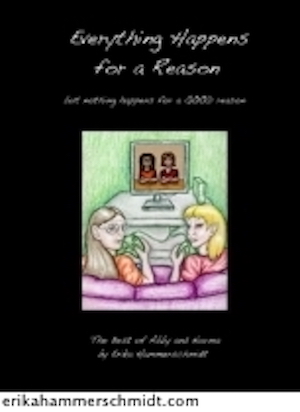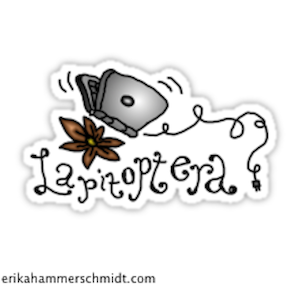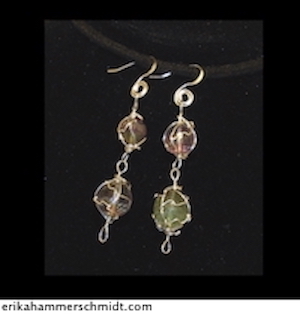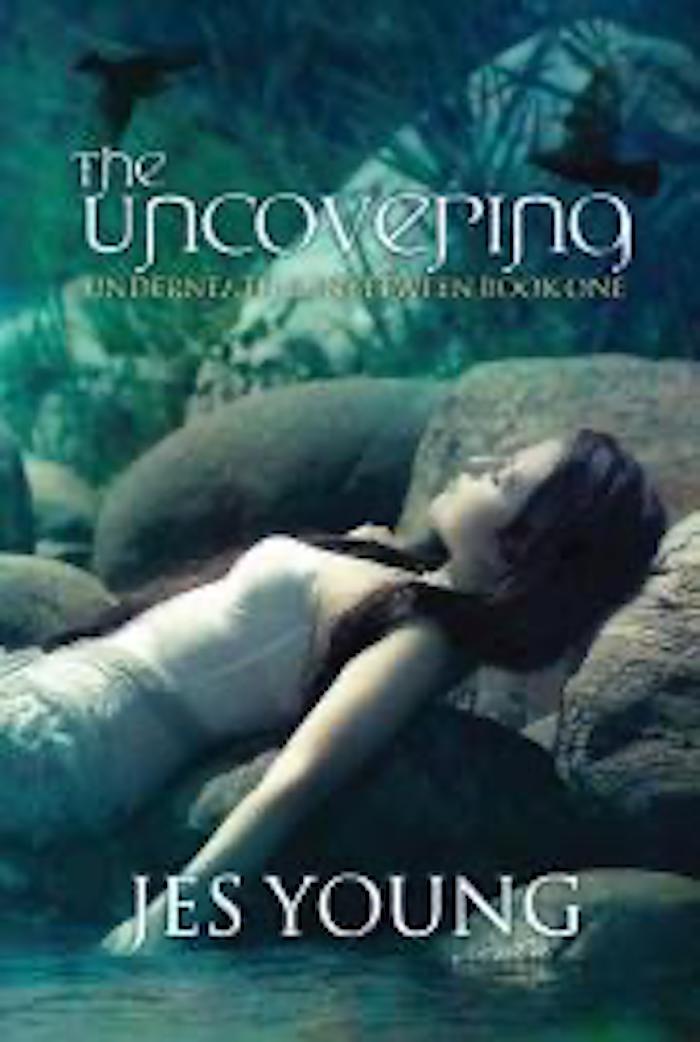
Erika Hammerschmidt
Blogs from 2014

Sirius and his name
2014/1/2
I wanted to name my pet starling after a star, and I picked Sirius, but after living with him a while-- and watching some Farscape-- maybe I should have picked Rigel.
He's a greedy little sucker who spends most of his day eating and excreting, and yet somehow manages to be adorable. He's got much more in common with Rygel XVI from Farscape than, say, Sirius Black from Harry Potter.
(Also got a few Ferengi traits, mainly wanting his food pre-chewed for him. He's got no interest in my sandwich until I take a bite, then he's poking his beak in trying to pry my mouth open...)
Hunger strikes: a baffling human custom
2014/1/3
Strange things happening these days. This anti-gay-marriage protest is probably the worst thing a hunger strike has ever been used for.
In fact, I've often thought about how strange it is that hunger strikes are socially acceptable at all. They're really just a variation of "I'm going to commit suicide unless you do what I want."
Usually you end up institutionalized if you say something like that. Does the method of suicide really matter that much?
Hangers
2014/1/4
Sometimes I wonder why plain wire coat hangers are so hard to find in retail stores like Target or Wal-Mart. You can find the plastic hangers and the wood hangers, and sometimes really thick metal hangers, but not the simple hangers that are made out of a plain old 16-or-so-gauge wire bent into a hanger shape.
You know, the kind that's cheap, and doesn't take up much space, and is tougher than plastic hangers and doesn't break after you've hung a coat on it for six months.
Maybe someone at the top of the corporate world decided that selling wire hangers was too dangerous, because women would just use them for abortions?
One time I was looking for hangers in a store, and my brain thought up this elaborate corporate conspiracy, complete with pervasive surveillance and abortion-police keeping files on people:
"Warning, warning. Hanger alert. A woman in aisle P17 has asked an employee where the plain wire hangers are."
"Commence surveillance on subject. Bring up her internet history, make note of any abortion-related searches."
"Alert! Subject's pharmacy records show she takes birth control pills. If she's pregnant she would undoubtedly be seeking an abortion. Must bar her from all access to hangers. Intercept if she approaches a dry cleaning service."
"Danger! Danger! She is buying 16-gauge wire from a hardware store!"
"Roger that. On my way, following her home."
"Do you have a visual on the inside of her home? Repeat, do you have a visual?"
"Roger that. I have her on screen."
"What is she doing with the wire?"
"She's... making hangers out of it."
"...Hmm. This is a devious one. We'll need to keep extra close tabs on her."
Seriously, though-- plain wire hangers are great. Not only are they the most durable hangers you can get for the money, but they can be used for all sorts of clever household solutions-- including this thing I came up with today, when I needed another over-the-door hanging hook and didn't have time to go buy one:
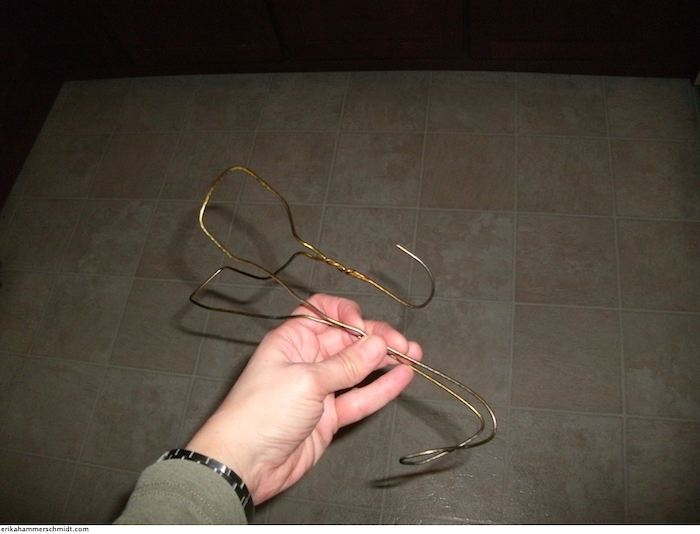
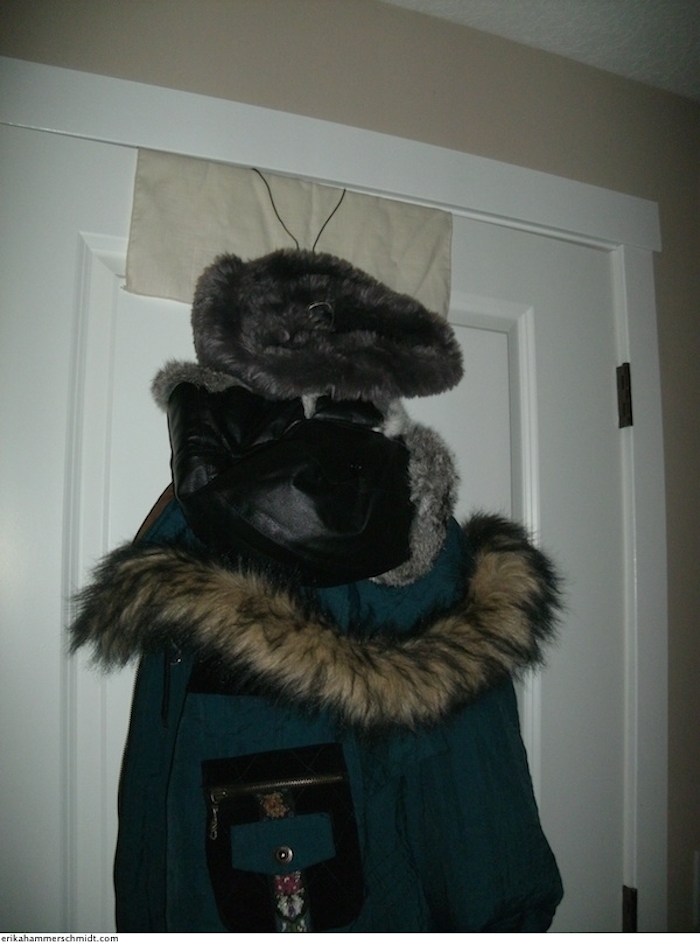

(I agree they're probably terrible for abortions, though.)
New blogging schedule: let's see how long I can keep this up!
2014/1/10
Lately I've been getting lots of inspiration to write about my insights and thoughts.
So much, in fact, that I'm going to try and update my blog every week, on Sunday, with some new and profound exploration of life.
So if you're going to start following this blog, now is the time. There's an RSS link in the tabs at the top.
Enjoy.
I am not the archetypal author: Why "in character" has no meaning
2014/1/16
I realized that, if I had written about this experience and included it as a scene in one of my works of fiction, many readers would accuse me of "inconsistency" and "not staying in character."
As a real, non-fictional person, of course, I don't have the concept of "in character." I'm not any of the fictional archetypes-- not even the more complex archetypes, since none of them are as complex as a human being. Whatever rules I come up with to describe my behavior, there are always exceptions, and even I can't always define where and what those exceptions are going to be.
The rest of this essay has been taken down for inclusion in my next memoir. Stay tuned for updates.
Earrings that make your ears pointy!
2014/1/19/
I have weekly blog posts planned pretty far ahead, but if something presently relevant occurs to me on or around the day of the post, I may post it in addition to the "main" post for that day.
This is one such entry.
Current events in my life: Two nights ago, I went to the local monthly autism meet (the same thing where I misinterpreted fireplace instructions a while back.) This time I brought my jewelry-making supplies, and by the end of the night I had invented Elf Earrings:
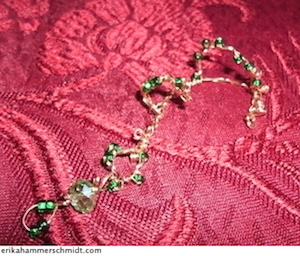
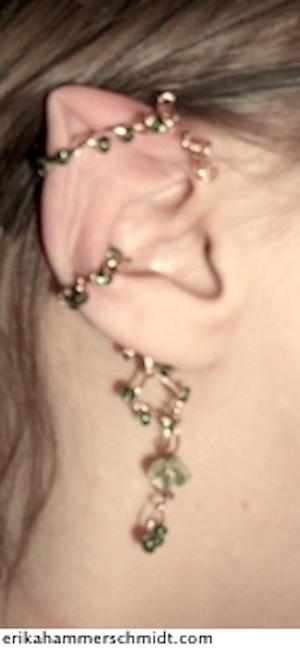
Wore them most of the day on Saturday, and can report that they aren't as comfortable as the usual ear cuffs I wear, but a lot more comfortable than clip earrings.
As for the question of whether they permanently make your ears pointy if you wear them long enough, results are inconclusive and require further research.
(But once I fine-tune the design a bit more, I promise they will be up on my jewelry page !)
A life-hack that actually embarrasses me a little
2014/1/25
You know you're cheap when this series of thoughts goes through your mind:
1. I have two cardboard boxes full of clothes I don't want.
2. I need a few tiny tables or nightstands in the bedroom.
3. Therefore, I will put the boxes inside stretchy pillowcases, put cloth napkins on top of them, and call them tables.
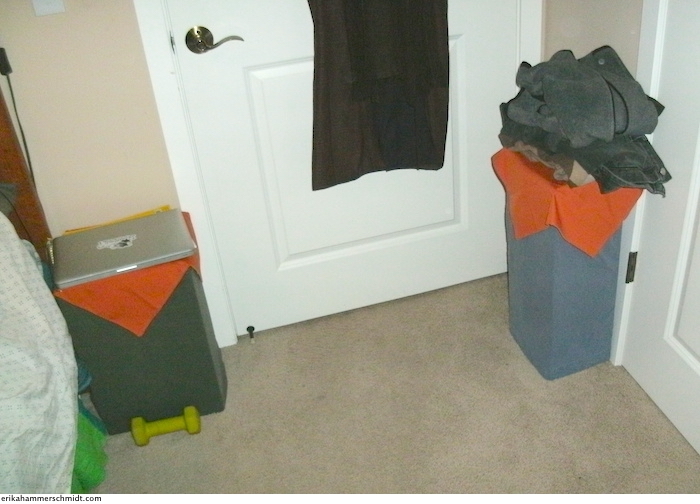
I guess I am cheap. But I can live with it.
Cybermoths and phallic Daleks: My complex love of puns
2014/01/26
What I mean is that I'm not anindiscriminatepun-lover. I am a pun connoisseur, a pun gourmet. I love puns passionately, but I have standards.
The rest of this essay has been taken down for inclusion in my next memoir. Stay tuned for updates.
I am high on chocolate, so I have no idea if this post makes sense
2014/01/27/
So I recently saw this gif online:

And yeah-- wow, it does make you think about how big the universe is.
But maybe it's not quite as big as that gif makes you think. Why? Because the far-off galaxies that it shows might not all be different galaxies.
Space is curved. If you could look far enough in the distance, you'd see past the edge of the universe, and because of spatial curvature, your line of sight would continue at the other side of the universe, and you'd see things that are actually behind you.
Of course, you'd be seeing those things the way they were many millions of years ago. So if you notice three different galaxies and they all look different, maybe you're just seeing the distance to the edge of the universe repeated three times, and they're all the same galaxy from different years.
Hey, let's take the idea to an extreme. Maybe our galaxy is the only one that even exists. Maybe the universe's edge is right outside the Milky Way, and everything we see out there is just older versions of our own galaxy!
Screw it-- maybe Earth is the only planet that exists. Maybe Jupiter is what the Earth looked like 43 minutes ago! Maybe the Sun is what the Earth looked like 8 minutes ago! Can you disprove me? Did you look at the Earth from outer space, eight minutes ago? Do you know what it looked like then?
In fact, I'm the only object that exists! The edge of the universe is a few inches outside my body! When I look at my husband, or a street light, or a sandwich, I'm just seeing how I looked a few nanoseconds ago! I'm ever-changing! It's great!!
I think I'm on a sugar high. Shouldn't have eaten those two handfuls of chocolate chips...
...my god, did I just eat my past self? How does that even work? Time paradox!!
Signing off now.
Autism Speaks, and the other organization that's actually helping
2014/01/30
In the midst of all the anger towards Autism Speaks, I'd like to give a shout-out to Autism Works:
The problem with Autism Speaks is that it focuses not on helping people with autism, but on preventing more people with autism from being born. Their argument is that there's a huge number of autistics in the world, and it'll be a disaster if they have to be supported for the rest of their lives.
But there are at least two flaws with that. Firstly, their eugenic plan to prevent more autistics from existing is doing nothing at all to help the autistics (and their families) who are trying to get by in the world today.
And secondly-- if your count of "the huge number of autistics" includes everyone with a diagnosis of any autism spectrum disorder, then most of that number is comprised of people who could be greatly productive and successful in the right workplace! To avoid the problem of their unemployment, you don't need to prevent their existence, for goodness' sake. You just have to find them good jobs.
Autism Works is the organization that is actually helping with that. They have a very effective, very innovative approach that matches autism-spectrum individuals with jobs that they can do well. They're currently working with my husband John, and I'm impressed with how accepting, helpful and open-minded they are, and how well-thought-out their system is.
And, among all the autistic people they find jobs for, there are many who get jobs working for Autism Works itself. This organization knows that to help people on the autism spectrum, it's best to have some viewpoints from the autism spectrum on your side.
So, if the "autism epidemic" turns into a golden age of technological and creative development in our society, they will be partly to thank for it! Go Autism Works!
Jeopardy and mountain bears: Coincidences are everywhere!
2014/02/02/
In all the years since that happened, we've never figured out a connection that could explain why David and I thought of Alex Trebek at the same moment. Most likely, it's because the whole thing was a freaky, weird, one-in-a-million coincidence.
And freaky, weird, one-in-a-million coincidences happenall the time. You have millions and millions of experiences every day, tiny ones, big ones, overlapping with each other, noticed and unnoticed. Statistically, one-in-a-million events should be occurring multiple times daily. In fact, if you think about it, everything that ever happens to you has a vanishingly tiny chance of happening exactly the way it happens. And yet it does.
The rest of this essay has been taken down for inclusion in my next memoir. Stay tuned for updates.
Having a sh!t-in: Why sex-segregated bathrooms hurt all of us
2014/02/09
When I was a grade-school kid, having just learned the history of Jim Crow and Rosa Parks and sit-ins, I became inspired to protest segregation in my own way.
I started hanging out in the boys' bathroom.
To me, dividing bathrooms by sex didn't seem any less bigoted than dividing them by race. People were uncomfortable using the bathroom in the presence of the opposite sex? Well, in the days of Jim Crow, people were uncomfortable using the bathroom in the presence of another race; that didn't make segregation acceptable. Sexual crimes happen in bathrooms? Well, so do racial hate crimes, sometimes, but that's no reason for racial segregation.
No one listened to my arguments. I saw the inside of the principal's office more often than the inside of either restroom.
At the time, I wasn't even very aware of transgender issues. I was focused on the ways that segregation hurts everyone . The girls like me who didn't try to look boyish but always got mistaken for boys anyway. The disabled adults who needed help to use the bathroom, and whose only available helper was someone of the opposite sex.
Have you ever been denied the right to use a public restroom because the restroom for your sex was closed for cleaning? Then you, too, have been a victim of segregation.
And now, in this era of slightly increased transgender awareness, society is finally starting to realize that the issue even exists.
All over the news are articles about transgender people fighting for the right to use the public restrooms intended for the gender they identify with. The struggles they have to go through to fulfill this basic need are heartbreaking.
One issue that always seems to be ignored: This discrimination can be ended only by eliminating segregation entirely.
It's a simple line of reasoning. If you have a rule that men have to use the men's room and women have to use the women's room, then:
1. Having that rule is pretty useless unless you can enforce it.
2. To enforce it, you have to be able to define who is a man and who is a woman.
3. And you have to be able to identify people as men or women just by looking at them, or some other test that can be performed in the moments before they enter the restroom.
Pretty impossible.
You could define it by who looked male or female to you, but that leaves tons of potential for error. I would have been kicked out of the girls' room as a kid, if it had been based on people's ability to tell I was a girl by looking at me.
You could define it by the clothes people were wearing, so that anyone who was presenting as a woman could enter the women's room... but how do you define women's clothing? Would I not be allowed in the women's room if I'm wearing a gender-neutral t-shirt and jeans? And how do you tell a transwoman from a cis man who puts on a dress so he can legally go in the women's room and ogle people?
There was a city that tried to enforce it by looking at the gender printed on people's state IDs. But this discriminated against transgender people who had not had their IDs changed to reflect their reassignment-- as well as people who didn't have an ID with them.
The only solution is not to segregate the bathrooms in the first place.
Before you criticize this option, and rail against me for desecrating women's privacy and encouraging sex crimes... take a look at this picture of an actual unisex restroom.
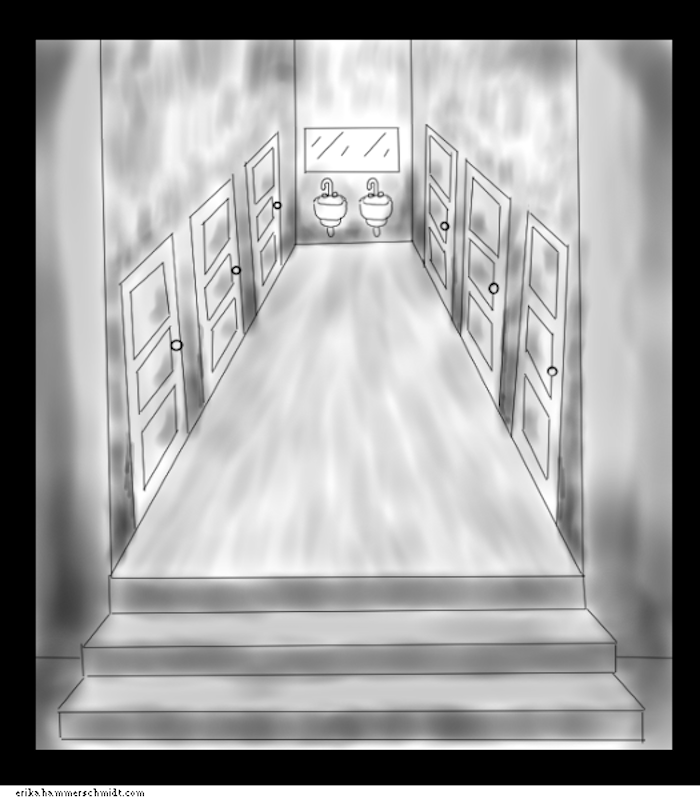
This is a drawing I did from memory, of a bathroom in a local theater here in MN. See how each stall is its own little room, with thick walls, and a door that goes all the way to the floor? See how the common area with the sink is out in the open, so anyone who wanted to harass someone would be in plain view of pretty much everyone ?
A unisex bathroom gives you more privacy than a segregated one.
And it solves all the other problems too. It removes the debate over which bathroom you should use when people disagree on whether you're a man or a woman. It provides a welcoming environment for disabled men who need the help of a wife or mother to use the bathroom, or vice versa. And each stall is cleaned individually, so no one ever has to wait for the "correct" bathroom to be cleaned before they can use it.
If you agree that all bathrooms should be like this, spread the word. Perhaps we can make a difference.
My ostracized childhood self, leaning against the wall in the boys' room greeting every visitor with "Hello, I'm having a shit-in!" may have been taking the wrong approach. It may have been more a plea for attention than an earnest expression of my beliefs. But I did have those beliefs, and they were on the right track. Maybe someday they will finally be vindicated.
More freaky coincidences, and the meaning of art
2014/02/16
Either I'm the master of dumb luck, or my subconscious is a much more thoughtful artist than I am.
Maybe someday my subconscious will be revered as a great painter. Perhaps, years from now, the seemingly nonsensical system that decides which paintings are "great" will somehow latch onto my acrylic-on-canvas dabblings and the meanings that my subconscious inserted so insidiously into them.
The rest of this essay has been taken down for inclusion in my next memoir. Stay tuned for updates.
Neurosis, math, grammar, empathy, and the transformative power of love
2014/02/20
Falling in love can change a person in so many ways.
I'm not just talking about how you become a different person when you're falling in love and your levels of bonding hormones are all over the charts. That's a whole issue of its own, with its own set of relationship problems. (Ever think, "He's not the man I fell in love with anymore," or "We got married and then he changed everything about himself"? Maybe he just changed back into the person he was before he fell in love... and for that matter, so did you. Oxytocin and the other mating hormones that run rampant at the beginning of a romance are powerful mind-altering chemicals; the mind you fell in love with was probably under the influence.)
No, what I'm talking about is the change that happens over the course of a long, happy relationship. It can be slow, or fast, changing speed and intensity over time, but it's always there, the way two trees growing close together change their shapes to adapt to one another's presence.
The rest of this essay has been taken down for inclusion in my next memoir. Stay tuned for updates.
SpringCon again!
2014/02/23
This year, for the second time, I am participating in Springcon : a local comic book festival at the State Fairgrounds in Saint Paul, on the weekend of Saturday May 17th and Sunday May 18th.

I'll have several of my self-published books available for sale, including the big Abby and Norma collection :
and all the cheap little Abby and Norma Minibooks:
I'll also have some Abby and Norma merchandise and some jewelry for sale!
I will be sharing a table with Aaron Poliwoda, a local comic artist with whom I've collaborated on a few projects .
Getting there isn't too hard. From most places in the Twin Cities, you can get to downtown Minneapolis by bus. Once you are there, this is the route you take.
The rest of the route, from downtown to the fairgrounds, is only one bus: the 3B.
This is where you catch it:

It goes like this:

and you get off when you see this:
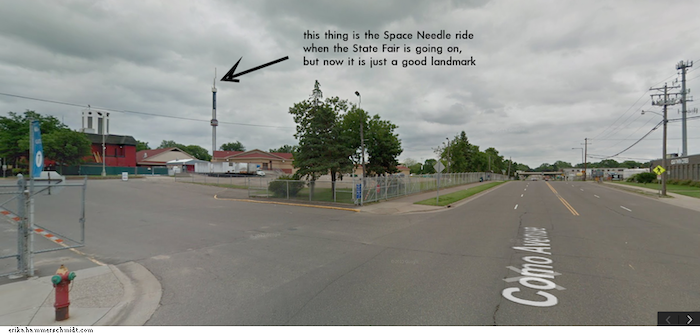
and then you just walk through the State Fairgrounds until you see this building:

Have $10 with you for the fee to get in, plus enough more to shop for cool comic-related stuff! There are lots of awesome vendors at this thing.
Enjoy, and I hope to see you there!
The animal-hoarder of 1930's Vienna: A review of "King Solomon's Ring"
2014/03/02
I've just finished reading Konrad Lorenz's "King Solomon's Ring," a naturalist's account of his life with a ridiculous number of not-so-domestic animals. It was recommended to me by a guest at a speech, because I had mentioned during the speech that we had just adopted a pet starling. So, of course, I went into this reading experience with the expectation that starlings would be a main feature of the book.
In that respect, I was disappointed, but overall the book has been more fun than I could have imagined.
It was published in 1952, and describes events from much earlier, most of which took place in Europe before World War II. Lorenz was an Englishman living in Austria (having lived in Austria for a semester myself, the setting as well as the subject matter was of interest to me). He, and his wife and children, lived in a house that also contained dogs, mongooses, monkeys, apes, parrots, jackdaws, geese, lemurs, hamsters, water-shrews, crows, an eagle, and any number of other bizarre animals-- mostly not even kept in cages, or if they had cages, they were allowed outside of them most of the time. Lorenz saw his pets as both companions and research subjects; he let them run free partly because he valued their happiness, and partly because he felt he could observe their behavior more naturally that way.
In both the body of the book and the foreword by another author, Konrad's wife is described as saintly for putting up with all this. She's quoted as saying that she managed to tolerate it because she spent more time at her job than at home. But, as another married woman with a fascination for nature and the bizarre, I find myself wondering. Did she put up with it because of a sense of wifely duty? Or did she actually, deep down, enjoy living in a zoo-- as I might-- but feel hesitant to say so in a day and age when no "proper" woman would feel anything but disgust for such a situation?
In the present day and age-- and in the USA-- such a situation, of course, wouldn't even be tolerated by law enforcement. Native birds can't legally be taken from their nests as Lorenz described (though non-native birds like starlings are fair game) and there are very few places to live where you could keep a pet ape or mongoose without some sort of special permit. From his account it seems that his animals were happy, but I can still imagine modern neighbors rushing to call animal control (not to mention child protection services-- according to his narrative, sometimes the only safe place for a child in his house was inside a large cage.)
But his stories of animal behavior are still delightful to read, if one makes allowances for the time he lived in, and the different values of that time.
He gives a fascinating account of the territorial behavior of sticklebacks and cichlids in his aquariums, making the reader see more depth and complexity in these little fish than previously imagined. His story of keeping water-shrews is hilarious, this time not because of the animals' complexity, but because of how simple their minds are, and how absolutely baffled they find themselves when an obstacle in their cage is moved.
For a scientist of his time period, I find his view of animals surprisingly balanced between the extremes of anthropomorphizing them and reducing them to thoughtless and unfeeling automatons. He recognizes that, being distantly related to us, they have many of the same basic drives and instincts as humans, and probably feel similar emotions, but he also frequently reminds the reader that the animals come at things from their own perspective, which is often totally unlike the human perspective.
There certainly are times when I suspect he's jumping to conclusions in his interpretation of his pets' behavior. It's easy to be wrong about the motives for an action, even the action of a close human friend or relative, let alone the action of a creature physically and mentally very unlike us and living a completely different sort of life. He makes the best guesses he can about why his animals do what they do, but his observations are inevitably somewhat hampered by his own attachment to them and the not-quite-natural environment in which he's observing them.
He's also, of course, a product of his time when it comes to errors in the biological sciences. He devotes an entire chapter to the differences in personality and temperament between the breeds of dogs descended from wolves and the breeds descended from jackals-- which looks pretty ridiculous to someone reading in an era when all the genetic evidence indicates that dogs are 100% descended from wolves and none of them have any jackal blood.
Still, for his era, he's very advanced in his understanding of animal behavior, and even when he might be wrong, his accounts are still a lot of fun to read. I only wish he had written more about starlings.
His mentions of starlings are confined to a few paragraphs, in which he recommends them as an easy-to-raise pet for the inexperienced keeper of animals, and describes their infancy, rate of growth, and the diet they should be fed in captivity. He only briefly mentions that they can be affectionate and learn to mimic words.
In the little he says about them, I can see tons of things that would outrage my friends on the Starlingtalk.com forum. The foods he advocates have virtually no overlap with what present-day starling-keepers consider a healthy diet, and he actually recommends taking infant birds from their nests to raise them, which is heavily frowned-on among the starling-lovers I've met online.
But for me personally, the biggest disappointment was that he didn't include any actual stories of life with a starling. He makes it known that he raised them, but sadly, he gives no specific examples. His accounts of the antics of his other pets are so delightful that I think I would have loved some funny tales of the things his starlings learned to say, the mischief they made playing with jewelry and the like, or any of the other silly things that they must have done, if my own pet starling is at all typical of the species.
He does make up for it, though, by giving many pages to the lives of his colony of jackdaws. They're not starlings, but they are similar birds, being very social, very affectionate and able to mimic speech. The hierarchy, social rules and interactions within his jackdaw society are utterly fascinating and lovingly described, reminding me a lot of the descriptions of raven society in the more recent book "Ravens in Winter."
Even though starlings were somewhat neglected in his narrative, I've found that a side effect of reading Lorenz's prose is a tendency to observe my own pet as he would. Whole paragraphs of Lorenzian naturalist description pop into my head from time to time as I watch Sirius the starling, and I find myself wording my own my observations in a 1950's English scientist's writing style:
"On the whole, Sirius prefers for his sustenance such foods that are white or very light-coloured, or black or very dark-coloured, and regards with suspicion any proffered fruit of a brighter orange or red hue; this, I believe, owing to the proclivity of the starling for feeding primarily upon insects in the wild, and his instinctive knowledge that the insects upon which a wild starling may most safely feast are those of dark colouration, such as the ants and house-flies, and the black beetles which are ever present in a garden, as well as those of light colouration, as the larvae of such beetles, and fly-maggots-- the species that bear patches of bright colour most often doing so to signal to their enemies that they are venomous, or at the very least, foul-tasting."
Prejudice and promiscuity, and my own fictional archetypes
2014/03/09
I've been thinking with some concern about two issues relating to my webcomic "Abby and Norma."
One is the simplicity and one-dimensionality of some of the minor characters; their tendency to serve as cardboard cutout counterpoints to Abby's arguments, and whether I should just let them be what they are, or try to build them into something more complex and interesting, if not realistic.
The second is one particular facet of that simplicity: the sexually promiscuous nature of Abby's enemy Cathy.
The term "slut-shaming" has gained a lot of ground in recent years. People are becoming more and more aware that the world is cruel to those who have many sexual partners. Promiscuous women are labeled as "sluts" who have no self-respect. Promiscuous men are generally treated better, but still not great: they're often seen as sexist "womanizers" who have no respect for their partners.
These characterizations are, of course, unfair, though they're based on grains of truth. It's totally possible to have lots of casual sex and still be careful, responsible, and respectful of everyone involved. Sex is perfectly fine as long as you're honest about what you're getting into, and considerate of other people's happiness and well-being. It's true that many promiscuous people break these rules, but that doesn't mean promiscuity in itself is bad.
Certainly I didn't intend for Cathy to be a slut-shaming stereotype. As I've said before, the character of Cathy is a mixture of all the things my school-age self found distasteful in other students. And back when this mixture was being formed, I had little or no knowledge of slut-shaming. In fact, in my own personal high-school and college experience, the very opposite seemed to be happening.
Maybe my view was warped by my social difficulties, but to me, in school, it always seemed that having a wildly active sex life was considered normal, and that I was considered a loser because I didn't; because I focused my attention on nerdy, uncool things like art, writing and schoolwork, instead of sex. Everything I observed in high school and college indicated to me that being a slut was cool, popular-- all the things I wasn't.
I don't remember ever seeing any slut-shaming. Maybe I just couldn't recognize it, or maybe it wasn't common in the state I grew up in or the schools I went to, or maybe the popular kids never did it around me. But I do remember a lot of virgin-shaming, aimed at me and other geeks.
Back then, the only social distinction I really saw was the distinction between nerds and non-nerds. From my perspective, the girls who had one long-term boyfriend, the girls who had a different boyfriend every month, and the girls who had one-night stands every week were all blurred together. To me, they were all just "the girls who looked down on me for having nothing."
I realize that they probably didn't look down on me as much as I thought, at least not for that reason. But at the time, I had a very long memory for all the moments when it seemed as if they did. I felt as if sluttiness was the prevailing world order, and I was the downtrodden underdog who dared to consider my grades more important than my sex life.
When I learned the word "slut," it felt like a weapon of the resistance, a way for oppressed geeks like me to fight back against the insanity that was considered normal. It felt like learning that I could use the words "sheep" and "conformists" to insult those who followed social rules. I didn't feel that I was oppressing sluts, I felt I was rebelling against their oppression of me.
Of course, being who I was, I didn't actually go around calling anyone a slut. For the most part I stayed buried in my books and drawings, ignoring and ignored by my so-called peers. But sometimes I thought dark thoughts to myself about the popular and promiscuous. The word "slut" may have made its way into some of my internal rants.
I did eventually outgrow this simplistic hatefulness. As I grew up and built a more diverse and sophisticated circle of friends, I began to distinguish between promiscuity and virgin-shaming. I learned that people are complex, and not everyone who sleeps around is a nerd-abusing cheerleader or jock. But somewhere inside me remained the old, simplified view, the traces of how my schoolgirl mind had divided the whole world into geeks and antigeeks.
And even once I knew better, Cathy rose up out of those ancient feelings and took her place in the comic, because the feelings were too old and ingrained to stay out of all the things I created. The more I write Abby and Norma, the more I realize that Cathy is not like any real person I know, and that some people might even be hurt by her portrayal of promiscuity.
Cathy is evil not because of her slutty ways, but because she tries to force them on others, insulting and belittling Abby for not being slutty like her. She is what I used to think all normal students were like, back when I was in school and trying to figure out the world.
Abby is often a caricature of me, expressing opinions that are exaggerated versions of opinions I have or used to have. Abby's mom is a caricature not of my own mother, but of the annoying traits of some other mothers I've known. Likewise, Cathy seems to be a caricature of non-autistic students, taking some of the things they occasionally do and exaggerating them to ridiculous extremes.
I don't know how, or if, I could ever develop her into a more realistic character. I don't know if "Abby and Norma" is even supposed to be the kind of comic that has realistic characters. But I felt I should write something to shed light on the origins of Cathy, and how the way the world looked to me as a teen and young adult is quite far from the way it looks to people today.
My one regret: I didn't spend enough time working
2014/03/16
They say that people never die wishing they had worked more.
But I'm pretty sure that if I died now, that would be my one big regret. I fully expect to die someday wishing I'd worked more.
Not at my job, necessarily, but at writing, participating in events, talking to people, making connections. Perhaps even if I worked harder at my paying job, earned more money, earned promotions, that would have contributed something to my life's goal.
My life's goal is to make my way into a position where I have the influence to help fix the greatest problems in the world.
The rest of this essay has been taken down for inclusion in my next memoir. Stay tuned for updates.
Vicious predator
2014/03/20/

The prehistoric Terror Bird rips flesh from the dinosaur it has just slaughtered. (Or, Siri the starling likes watermelons.)
Thoughts on feeling proud
2014/03/30
This is a reposted post from my old blog, circa April 2013. Posting it because I was thinking about it, and realized my newer readers may not have seen it.
To those who ask "Why isn't it okay to have white pride, or straight pride?"
My own answer:
I am not proud of being white, or straight. But I'm also not proud of being a woman, or having Asperger's Syndrome, per se, because I did not choose those things. What I do feel pride in is the accomplishments I have made despite those traits and the way society reacts to them.
I feel that pride is for things you accomplish, not things you have no control over. So, to me, gay pride or black pride or women's pride is real and laudable, but it's not about feeling proud of a characteristic you can't control. It's about feeling proud of the things you've accomplished in the face of prejudice. And that's why there is no sense in being proud of an uncontrollable trait for which you have never experienced discrimination.
Gardening update
2014/04/03
John gave me a Twilight cup as a joke, and I put it to the most practical use I could think of.
Today there is a single tear running down Edward's face. It probably splashed over from watering the beans, but I like to think he is weeping about the garlic growing in his head.
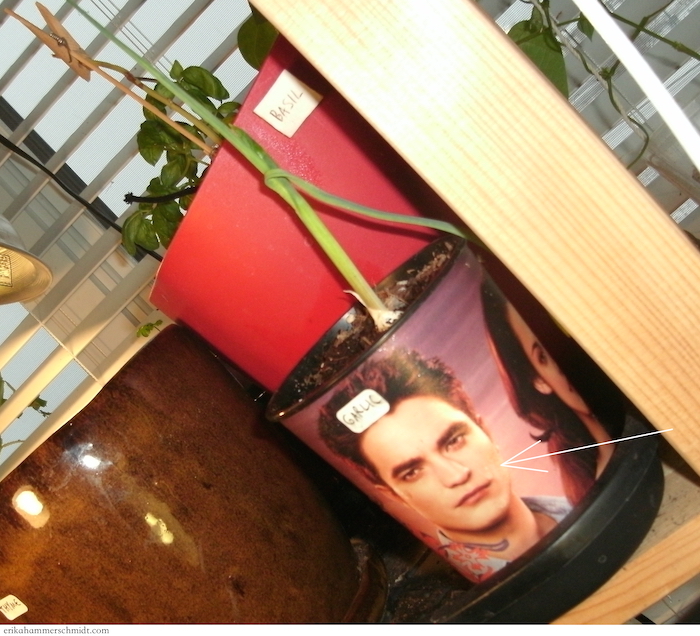
Personally, I just plan to get a huge sugar high.
2014/04/04/

Creepy midnight memory
2014/04/06/
This is another repeat post from my old blog, this time from July 2012. It was weird enough that I thought it was worth sharing. (To me, weird = valuable. Your mileage may vary.)
I've been having strange experiences with dreaming lately.
In the spring, when I was a few seasons into watching the Tenth-Doctor episodes of Doctor Who, I had a dream about being his companion. Up until then, I had had a totally asexual appreciation of the show. But somehow that dream triggered something akin to my teenage obsession with Mr Spock-- I realized with a sort of blinding flash that David Tennant was sexy (something every other geek girl had noticed long ago) and spent the next few months with a very intense crush on him, much to my husband's irritation.
Then, recently and perhaps unrelatedly, I had a much stranger and more morbid midnight epiphany.
I woke up to the sound of a thunderstorm, with something in my mind that felt like a memory. As far as I could tell, it had nothing to do with the dream I'd been having, which was sexy and Doctor-Who-related. It was vague, but it felt like a memory from real life, not a piece of a dream.
It seemed to be a memory of a time in my childhood or teens, when I was living at my parents' house. It was composed of images of me going through boxes that belonged to my parents, and finding a box that had been sent to them or given to them by some acquaintance. I don't specifically remember a name on the box, or any papers inside it-- there's just a feeling associated with it, a feeling that it came from someone who lived somewhere else, maybe one of our European relatives.
And inside the box were some bones and dried tissues that appeared to be human remains.
I don't remember what part of the body they appeared to be, or how many pieces there were. I don't remember what I did with them. But there was another strong feeling associated with the memory-- a feeling that I did the wrong thing, that I hid them or buried them or threw them away, without talking to my parents about it. I don't clearly remember why, but there was a feeling of fear, maybe fear that my parents would get in trouble for having them around. I vaguely remember wrapping them up in several layers of paper and tape, or some other sort of covering, before putting them wherever I put them.
Despite how vague this whole thing was, it stuck with me very strongly for at least a few days after it happened. I was thinking about it at work, for most of the next day.
I still don't know what it was. It could very easily have been a memory of a dream after all-- maybe a scary dream I had as a child, so long ago that the memory of it is no more vague than my memories of reality at that time. It felt real, but I know that under certain circumstances the brain can sometimes get confused between dreams and reality.
If it was real, I suppose there are quite a few possible explanations. It wouldn't be the only time there were human remains in my parents' house. They're doctors; they had a real human skull on a shelf in the living room for much of my childhood. I'm not sure why someone else would send them parts of a dead person, but given their professions and widely varied interests, it could have been anything from a medical sample to an archaeological specimen.
Anyway, I find it a very interesting example of how the brain can work so very differently in the middle of the night. When waking up from a dream, people can get so many inspirations, realizations, and new perspectives on the world, even ones unrelated to the dream itself. It must be something about the state of the brain as it shifts from dreaming to waking-- maybe it's overactive at that moment, in prime condition for dredging things up from the subconscious.
I don't know if my what I dredged up was a false memory, or a repressed memory of a long-ago dream or reality. But another interesting thing: putting together this blog post has changed the quality of what I remember. As I put it into words, it began to feel less vivid as a real memory, and more as if it could have been a dream.
This is actually something I've noticed before: putting my memories into words reduces their clarity as memories. It's as if my brain realizes that describing a memory in words is a way of compressing it to save space in my brain-- not lossless compression, but like resizing a family photo to a lower resolution. Actually, more like replacing the family photo with a text file saying "Christmas party, 2009. Left to right: Grandma Ruth, Aunt Carol, Mom, me."
My brain realizes that once I've summarized a memory in words, I don't need the visual, sensory and emotional detail of the memory anymore, and so it fades. I've hears that the people most likely to develop post-traumatic stress disorder are the people who think about their traumatic experiences in pictures instead of words. I'm a strange type of person-- someone who does much of her thinking in pictures and abstract concepts, but frequently puts them into words later.
Do Aspies Dream of Eclectic Sheep?
2014/04/13
The first time I tried to get to sleep this way, I watched about three or four sheep complete their uneventful motion through my mind's eye... and then the next one, at the apex of its jump, turned its head and grinned at me. It was wearing sunglasses, with garish multicolored frames.
That woke me right up.
The rest of this essay has been taken down for inclusion in my next memoir. Stay tuned for updates.
Just a reminder: one more month until SpringCon!! Save the date!
2014/04/14/
Springcon : a local comic book festival at the State Fairgrounds in Saint Paul, on the weekend of Saturday May 17th and Sunday May 18th.

Jewelry, Abby and Norma merchandise, and various self-published books will be for sale!
Spectacular, symmetrical, eloquent, elaborate, kaleidoscopic Abby and Norma poster! VERY limited time!
2014/04/15
Attention fans of my webcomic Abby and Norma, and anyone else who likes fantastic posters! Please read, please share and pass it on to your friends! Become a backer at app.net !
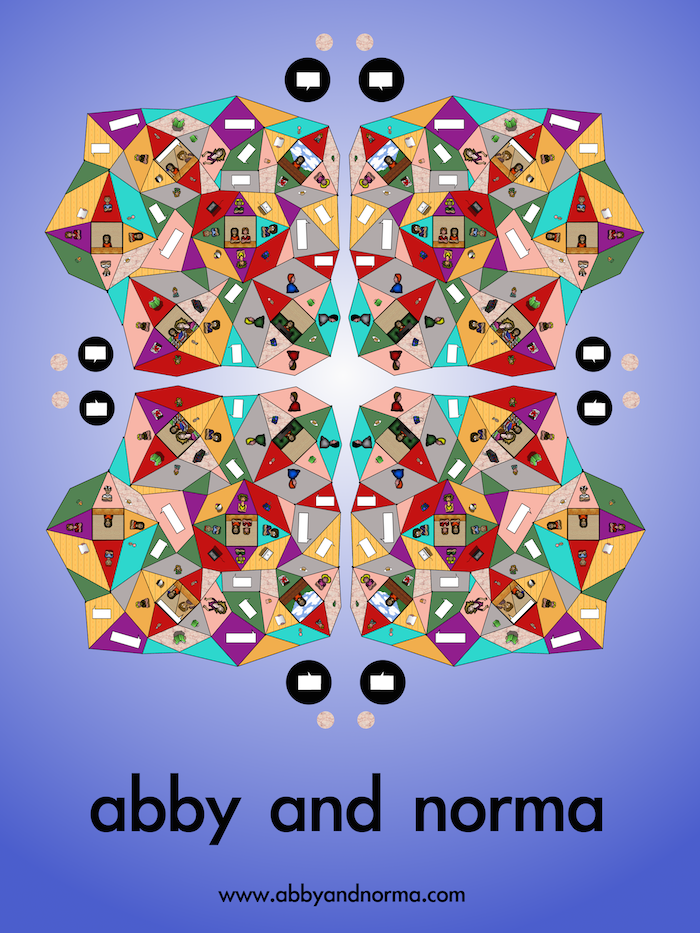
There is a Backer campaign to make a crazily cool, very exclusive limited-edition Abby and Norma poster! It will be a psychedelic geometric explosion of images and quotations from the comic, and will look awesome on your wall regardless of the style of your home.
And after this campaign is over, there will be NO MORE. You will own one of the very few posters like this in existence!
Remember Ron's art? He would absolutely approve.
Become a backer at app.net and get your own poster, plus loads of other cool stuff like books, stickers, t-shirts and even a chance to add your own idea to the poster design!
Abby and Norma Promotional Post!
2014/04/20
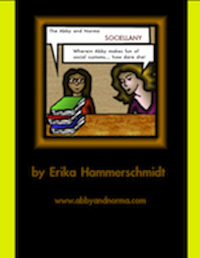
Is your favorite thing about "Abby and Norma" the vicious deconstruction of neurotypical social norms? Or Abby's obsessive exploration of legal loopholes and gray areas? Do you love the puns, but feel sad when Abby bashes down her mom's wistful hopes for grandchildren? Love the mom-bashing, but get annoyed when she debates religion with Chrissy? Love the religious debates, but hate Abby's badly-drawn doodles? Or do you read "Abby and Norma" solely for Ron and his palindromes?
Well, "Abby and Norma" Mini-Books are the answer for you! They're short printed collections ranging from 50 to 80 pages, and separated by topic.
Each costs only $5 or less , is printed on 8.5 x 11" paper with a grayscale interior and a full-color cover, and contains two bonuses (boni?) at the end:
(1). a pencil drawing of one of the characters in a realistic style, with an acrostic,
and
(2). an Abby and Norma Blooper-- a screencap of a moment during the copying-and-pasting process when some unintended humor or weirdness existed for a few seconds.
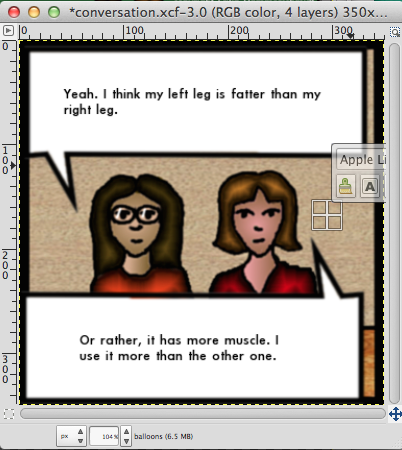
(Like this one, where I had just taken a panel where Abby had two speech bubbles, and flipped the second one to become Norma's bubble in the next panel, but I had not yet changed the text in them. I'll leave it to the slash shippers to try and come up with an explanation for how Norma "uses" Abby's left leg. o_O)
Collect all eleven (if you're into that) :
Wherein we make fun of religion.
The Abby and Norma Anthologician
Wherein we mess with logic, reason and everyone's head.
The Abby and Norma Compilegation
Wherein we deconstruct laws, rules and government.
Wherein we play with SO MANY WORDS.
The Abby and Norma Cultlection
Wherein we laugh at popular culture, both mainstream and geeky.
The Abby and Norma Festivitreasury
Wherein we survive the holidays, from Halloween to Christmas.
Wherein Abby's mom fails to convince her to pass on the family genes.
The Abby and Norma Palindromicon
Wherein we play with palindromes; semordnilap htiw yalp ew nierehw.
The Abby and Norma Psychosortment
Wherein we explore psychology. Also there's a doodle gallery!
The Abby and Norma Scianthology
Wherein we play with science! For Science!
Wherein Abby makes fun of social customs... how dare she!
Review of "The Uncovering," a fantasy novel by Jes Young
2014/04/22
"The Uncovering," by Jes Young, isn't a book I would have decided to read on my own. The fantasy genre isn't first on my list of interests (though I have deeply enjoyed some fantasy novels), and this one was labeled as "romance" as well, which I had come to associate with a writing style that interested me even less.
I encountered the book because I was on the Enchanted Book Tours mailing list, and despite its deviations from my usual fare, something about the synopsis must have caught my eye... I decided to give it a try and post a review.
The story is centered around a young woman named Tabitha who finds out that she is really an elvish princess, destined to take her place as queen in a magical realm and marry an elvish man called Alex. But while her family prepares to put her on the throne, other forces are plotting to kill or capture her.
An enchantment, placed for the purpose of ensuring a happy marriage, causes Tabitha and her betrothed to feel irresistibly attracted to each other, which leads to some quite intense sexual scenes. But the story isn't just built as an afterthought around the sexy parts, as many romance novels are. It's a complete story, with fight scenes, snappy dialogue and lots of cleverly worded lines that stuck in my head long after reading them. Like this one, reminiscing on her sister Rivers' long disappearance years ago:
Rivers left abruptly and without warning, which is, I guess, the crucial part of running away. If you plan it and tell everyone you're going to do it, that's just called moving.
Or this moment when she confronts her caretaker and asks him to "break the enchantment":
"Spells are broken," he said wearily. "Enchantments are laid and then, like a blanket, they are lifted. In any case we hardly make a habit of shouting about either in front of the staff."
I didn't think it was the time for a lesson in vocabulary or manners. Emily Post herself could have appeared to present me with a copy of the unabridged Oxford English Dictionary and I wouldn't have cared even one bit.
There is a lot of description of characters' appearances, from the color and style of their hair to the scarves and shoes they're wearing, and at times (as a somewhat fashion-unconscious nerd) I found it tiresome. But such visual descriptions did reliably paint a clear picture in my mind, and some scenes felt to me like small but memorable bits of a blockbuster fantasy movie:
After a moment of hesitation I picked up the ornate wooden box and carefully worked open the silver clasp. Inside lay a circlet, a delicate ring of braided platinum vines and flowers and diamonds flashed and sparkled. I touched it tentatively, just with the tip of my finger, and the flowers and vines burst to life, transforming into living roses and ivy and vibrant blue forget-me-nots. Clustered around the diamonds, the living flowers were more beautiful than the platinum imitation could ever hope to be. The flowers disappeared, becoming metal again, when I took my hand away.
This doesn't go down on my list of all-time favorite fantasy novels, because the plot doesn't contain quite enough complexity and originality to make a strong impression on me. I had hoped that the main character would do more exciting and ingenious things on her own, instead of just watching events unfold, and a few times barely managing, by not-all-that-creative means, to fight off people who want to attack her. I also hoped I'd get to see her spend some time in her destined fairyland, which, sadly, she doesn't get to visit before the book ends.
But then, this is only the first book in a series, and Tabitha does pretty well for a beginner who was thrown into the whole mess after a lifetime of thinking she would never have to handle crap like this. And if we don't get to see the inside of the elf realm she's destined to rule, that's all the more reason to read the next book in the series. I'm in no position to condemn that, in any case, since my novel "Kea's Flight" got criticism in one review for not ending with the ship landing on a planet. The planet is planned for the sequel, folks; I will get to it eventually. And, I'm sure, so will Jes Young.
I count it as a victory that the book managed to rack up more pros than cons for me, despite the annoying perfectionism I can sometimes have. My language obsession messed with the enjoyment in some parts, as it usually does when I'm trying to enjoy fiction. Sometimes I found sentences that contained errors or unclarity, like the second sentence in the paragraph about the crown. (Should the comma be a semicolon, or should "platinum vines and" be replaced with "platinum vines on which"?)
Other times I took issue with the way made-up terms were used, even though a fiction author has every right to use made-up terms however she wishes. (In this book, light elves are called "We of the Light" and dark elves are called "They of the Dark"-- even when they're the object of the sentence. On reading sentences like "You won't need to hide from They of the Dark," my pedantry kept screaming out, "From THEM of the Dark! THEM!" I'm glad I don't know any actual elves, because they would certainly not appreciate my attempts to police their use of their own elvish terminology.)
I really liked many of the descriptions of romance-- not just the sex scenes, but the handful of random realistic details about life and love that happened to catch my eye. I may not be one to talk, because my love life has consisted of pretty much just John, but I feel the author paints a believable picture of being torn between an old love and a new one, still having feelings for both.
For a romance novel, this is a surprisingly clever and entertaining book. The dialogue and internal monologues are witty and very alive, and I never had to make any effort to keep turning pages. It may not be a powerful and epic work of literature, but it's a fun read and I'm pretty sure the sequels will be even better, with the potential I see in this author.
Speaking of destiny, when I started reading this book I had no idea that it had starlings in it! Pleasant surprise there. They're not normal starlings, they're magical ones with red eyes and apparent psychic powers, but they're in the book:
"Well, one of them may have indicated that he wanted me to go outside."
"He said that?"
"He didn't say anything, because he was a bird. But he tapped on the window when I asked if he wanted me to come out."
"That wasn't a bird, it was a harbinger."
"A harbinger of what?" I asked. "You better not say doom."
"Not doom," George laughed, "change. The starlings means change is coming to you; one part of your life is over and another part is about to begin."
"Well," I shrugged, "they're certainly right about that."
"The Uncovering" is available from MP Publishing . Go check it out!
Here's an interview with Jes Young! Thanks for joining me on my blog, Jes!
Erika: I'm very entertained by your style of narrative. What fantasy and romance authors have inspired you?
Jes: A few years ago I decided I wanted to write a book about elves. I imagined it as your basic good versus evil, light versus dark, princess in disguise fantasy story with a beautiful heroine, a handsome prince, some unresolved daddy issues, and a quest for revenge. It sounded simple. I sat down and, drawing on everything I learned about writing fantasy fiction by watching the Lord of the Rings movies, I wrote the first draft of The Uncovering. And that's when I realized I had no idea what I was doing. I didn't know anything about fantasy, urban fantasy, or paranormal romance. I was in way over my head.
As is so often the case, I found the solution to my problem in a book, in many books actually but I feel most indebted to Karen Marie Moning and Kresley Cole. They both do, seemingly effortlessly, what I want to do with my writing. That is create fun, engaging, sexy, moving stories about people you really like and care about.
Erika: As I was reading the story, I found many of the scenes easy to imagine in a movie. I'm sure most of us authors fantasize from time to time about our work being made into a film. If "The Uncovering" were a movie, what actors would you imagine playing the characters?
Jes: Would you believe that I have a Pinterest.com board dedicated to this very thing? Jes Young
Erika: I once heard someone complain about some elf-related movie because the elves didn't have pointed ears. He said pointed ears are the defining feature of an elf, and if the ears are round you can't call it an elf at all. I can't say I agree with him, but I'm still surprised when I see elves that don't have distinguishing features of some kind. What factors affected your decision to make your elves look physically pretty much identical to humans (instead of having them look "traditionally" elvish and hide their appearance through some enchantment when in the human world)?
Jes: I'm pretty sure I read somewhere that Tolkien made that whole pointy ears thing up, and that before that the shape of elf's ear was not an issue. He was a storyteller, and a great one, so that's absolutely his right. Making stuff up, creating your world and the rules of it and what everyone looks like is a big part of what makes telling this kind of story fun. In my own work, I decided that what set the Elvish apart from the humans was their beauty, their, strength, and their eyes which change colors based on their emotional state. I liked the idea that they could almost blend in - but then not quite. I suppose it was a way of making them my own.
In the second book there's a character, a water witch named Jenny Greenteeth, who's green and she uses magic to blend in.
Erika: This may sound weird, but I love it that you included starlings in the book! I'm a bird-lover, and I have a pet starling that was raised from an abandoned baby. Sure, starlings are an invasive species and a pest in the USA-- probably because they're too smart for their own good-- but they just have a charm I can't resist. What reasons did you have for making starlings the "harbingers of change" in Tabitha's life?
Jes: The starlings are in the book because someone sent me a link to a YouTube video of a starling murmuration:
https://www.youtube.com/watch?v=eakKfY5aHmY
I watched the birds flying around together, looping and swirling in a way that seemed random and yet perfectly choreographed, and I thought it was beautiful and a little spooky.
When I sat down to write, that image was in my head. With no particular plan for them in my mind, I added them into the story - as atmosphere mostly. The more I wrote about them though, the more important they became until finally they'd taken on a life of their own. In the second book, they're a major character.
Once more, "The Uncovering" is available from MP Publishing . Go check it out!
Another reminder: 15 more days for the amazing Abby and Norma poster!
2014/05/01
Attention, fans of my webcomic Abby and Norma: the exclusive poster sale is halfway over! Become a backer at app.net before they're all gone!

There is a Backer campaign to make a crazily cool, very exclusive limited-edition Abby and Norma poster! It will be a psychedelic geometric explosion of images and quotations from the comic, and will look awesome on your wall regardless of the style of your home.
And after this campaign is over, there will be NO MORE. You will own one of the very few posters like this in existence!
Remember Ron's art? He would absolutely approve.
Become a backer at app.net and get your own poster, plus loads of other cool stuff like books, stickers, t-shirts and even a chance to add your own idea to the poster design!
Scream Dream
2014/05/03
Another reposted old blog post, from December 02, 2006. Apparently I had a lot of weird dreams back then. This one happened around the time I was writing the story "The End," which is now in my story collection If the World Ended, Would I Notice?

Superman fans, please do not take offense. I have never read a single Superman comic, and my knowledge of him is pretty much the stuff that everybody knows. My subconscious mind, though, seems to want to analyze his psyche, as evidenced in my dream last night. And it did a pretty bizarre job.
So, I had this dream where there was a character named "Screamer" in the Superman comic. She was supposed to be Superman's girlfriend (in the dream Lois Lane didn't seem to exist) and she was a superhero whose power was her ability to scream-- but I got the impression that her screaming didn't actually do anything to the bad guys, it just boosted Superman's power so that he could kick their butts.
And no one ever saw Screamer. Superman talked about her a lot, but he was apparently the only person who ever interacted with her. When he needed her help, he would go someplace where no one could see him, and then people would hear a scream, and he'd come back and say that Screamer had done her job.
In the dream, it seemed that there was a common idea among Superman fans that Screamer wasn't a separate person of her own, she was in Superman's head. The idea was that Superman did the screaming himself, and just told everybody it came from his unseen girlfriend. But it wasn't like she was an imaginary friend, and it wasn't like she was an alien consciousness trapped inside his head with him... it wasn't even a split personality thing, either. It was that Superman was in love with a part of his own mind... apparently the part of him that liked to scream, I guess.
And since the rest of the world would find that very odd, Superman personified this part of his mind as a girlfriend that nobody saw.
I do NOT know where this dream came from... except that I'm writing a short story in which a young lady experiences a sort of identity crisis, wondering who or what she truly is... and the Superman character is mentioned a couple of times in passing. And it's also the time of the month when my brain produces the craziest dreams.
Maybe I should name that part of my mind "Dreamer." And, like, lock him up somewhere.
Just another reminder: this is the month of SpringCon!! Save the date!
2014/05/04
Springcon : a local comic book festival at the State Fairgrounds in Saint Paul, on the weekend of Saturday May 17th and Sunday May 18th.

Jewelry, Abby and Norma merchandise, and various self-published books will be for sale!
Sometimes a lizard is just a lizard?
2014/05/11
Another reposted old blog post, from November 18, 2006. Yet another bizarre dream, and some psychological thoughts.

Forget Freud and his book of what things mean in dreams. Yes, dreams have symbolism, but it is different for every single freaking person.
The other night I had a dream where a lizard symbolized an aloe plant. Seriously. In the dream I had a couple of pet lizards that kept running around and getting their tails cut off in various ways. Like, I tried to keep them in my locker while I went to work, but I closed the locker on their tails and accidentally cut them off. I suppose they must've grown back, because they got cut off a lot of other ways too.
But the point is that when they lost their tails, the tail stump wasn't red, it was translucent green, like when you cut a leaf off an aloe plant. And then when I woke up, I noticed that my aloe plant had fallen off the shelf and was lying in a big pile of dirt on the floor. I mentioned it to my husband, who said that it had fallen off the previous day, but I hadn't noticed it and he hadn't gotten around to telling me.
So I must have noticed it subconsciously, and my subconscious mind was trying to let me know that my aloe plant was in trouble. Except instead of telling me directly, it had decided to symbolize it with lizards getting their tails cut off.
I have no idea why it chose that particular symbol, except that I dream about lizards a lot, and I also have a lot of dreams about pets suffering horrible fates due to human neglect or stupidity. (I suppose that has to do with the fact that I had a lot of pets as a child, and some of them did get hurt or killed because of errors on my part.)
Freud said that dreams use symbolism because there are things your mind can't handle thinking about directly. Supposedly almost anything sexual was in this category-- which is stupid, because people think about sex more than they think about anything else, and I'd certainly rather think about sex than think about lizards losing body parts. I personally think that dreams don't symbolize for any good reason, they just do it because they're confused and mix things up with each other.
Or maybe it was just a coincidence. But in any case I'm not asking Freud what it means when lizards lose their tails in a dream.
Last day for the fantastic kaleidoscopic Abby and Norma poster!
2014/05/14
Attention, fans of my webcomic Abby and Norma: the exclusive poster sale is alllllmost over! Tomorrow it ends! Become a backer at app.net !

There is a Backer campaign to make a crazily cool, very exclusive limited-edition Abby and Norma poster! It will be a psychedelic geometric explosion of images and quotations from the comic, and will look awesome on your wall regardless of the style of your home.
And after this campaign is over, there will be NO MORE. You will own one of the very few posters like this in existence!
Remember Ron's art? He would absolutely approve.
Become a backer at app.net and get your own poster, plus loads of other cool stuff like books, stickers, t-shirts and even a chance to add your own idea to the poster design!
One last reminder: today SpringCon begins!! Head on over!
2014/05/17
Springcon : a local comic book festival at the State Fairgrounds in Saint Paul, on the weekend of Saturday May 17th and Sunday May 18th.

Jewelry, Abby and Norma merchandise, and various self-published books will be for sale!

Grammar, rule exceptions, and thinking in words, pictures and raw data
2014/05/18

Did you know that words are not things?
Well, they are, in the sense that a word is a type of thing. But a word is not the thing that it's a word for. It is a symbol to represent that thing. The word "apple" isn't an apple. An apple is an apple. It doesn't need to be called by that word. It doesn't have an inherent name of its own. Names are just tools that humans invented for talking about it. It doesn't need to be called by any word to be what it is.
Of course you knew that. But you'd be surprised how often people forget.
The rest of this essay has been taken down for inclusion in my next memoir. Stay tuned for updates.
People's ability to change
2014/05/25/
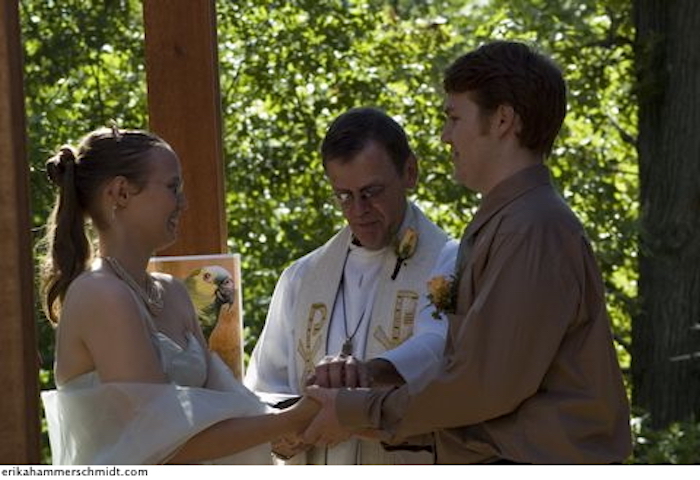
Sometimes change is what we need. People know this, deep down, even when they tell you that you should always be happy with the way you are. Even by saying that, they're trying to change you from someone who wants to change into someone who doesn't.
But is change always possible?
The rest of this essay has been taken down for inclusion in my next memoir. Stay tuned for updates.
How I backed up my personality on paper
2014/05/30
(Updated with the more recent version of the project. I redesigned the books to be prettier, fit better in the box, and hold more data.)
A recent art project, of sorts. My attempt to cope with fears: the fear of death, the fear of societal collapse. My fantasy that my personality could somehow survive both my death and the downfall of civilization.
In an apocalypse, digital media are of questionable use. I toyed with the idea of microfiches for a while, but then realized that paper, kept in a safe place, can last just as long. Lulu.com prints on acid-free paper, and can print very, very small.
Text of the back of the book:
I am Erika Hammerschmidt. I am an author, artist and speaker from Minnesota. I am terrified of dying, but far more terrified of being forgotten. Being forgotten is true death, the death not just of the body but of the information that makes up the personality.
The information that makes up a human personality is more bountiful and complex than any book can hold, but this is my best try. This is my novels, my poems, my private emails, my art, my journals. It is my secret perversions, my selfies, my websites, my handmade jewelry, my travel snapshots, my diaries, my childhood scrivenings. Please let me live.

























Some thoughts on autism spectrum disorders and violence.
2014/05/31/
On the one side are news stories that keep claiming that the latest mass shooter "was autistic," even when there is little or no evidence that they had such a diagnosis or any traits matching it.
On the other side, there are people rightly protesting this portrayal of autism, pointing out that "autistics are gentle, peaceful people" and "there is no correlation at all between autism and violence." I feel I have something to add to this.
The rest of this essay has been taken down for inclusion in my next memoir. Stay tuned for updates.
Birthday
2014/06/01/
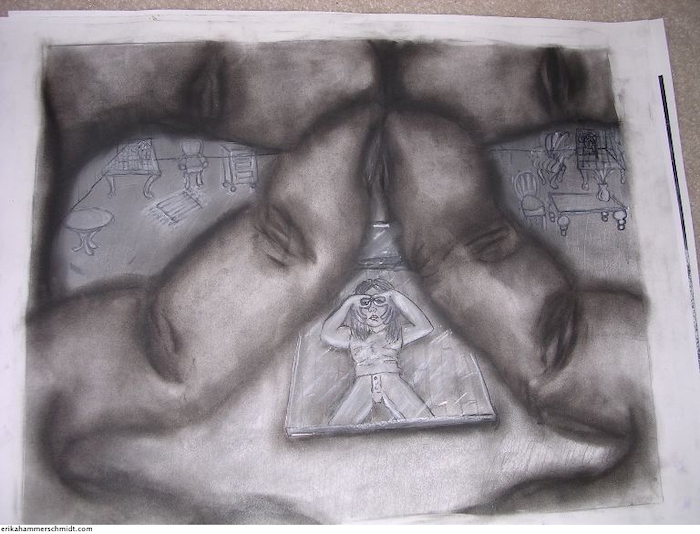
Today, the first of June, is my 33rd birthday.
I'm reaching the end of a long series of significant numbers. 27 was a cube number, three to the power of itself. 28 was a perfect number, the sum of its own factors. 29 was prime, 30 was a nice round multiple of ten, 31 was another prime, and 32 was a power of two (100,000 in binary).
33 is cool because it's palindromic and all the same digit-- but after this, I'll have to stretch if I want to keep the streak going (like claiming that 34 is awesome because of the internet meme of "Rule 34.") I think this may be the year to lay my cool-number streak to rest.
I plan to celebrate, as usual, with a small group of friends and loved ones. I'll bake my own cake, probably with the same strawberry frosting I made up last year (it was a buttercream frosting with actual fresh strawberries blended into it in the food processor, and it was pink and sweet and freakin' delicious). The candles will be little tea-lights in tiny glass holders. Three on one side of the cake, and three on the other. Yeah, baby, I use base ten for my birthday candles.
So, happy birthday, me.
A year of Sirius Marley Black: Starlings in review
2014/06/15/
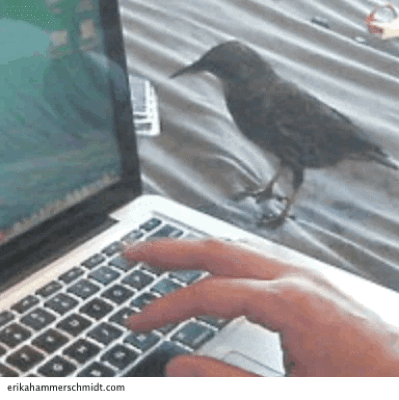
Several months after our parrot Rain Man went to his new home, the mixture of sadness and relief turned into empty nest syndrome. I had expected that I would want to adopt a new pet someday, and after all that time I was finally starting to feel ready.
I knew we had to choose carefully. I still felt guilty that we had given up our previous pet, even though his life and ours had become irreconcilable and he was undoubtedly happier with his new family. I knew how much of an upheaval it is for an animal to move from one home to another, and I wouldn't wish it on any creature. I wanted my next pet to be for life. I wanted a bird-- birds are what I relate to-- but it couldn't be a bird with the same needs Rain Man had.
John's parental instinct, like mine, is focused mostly on pet birds, but he didn't feel as strong a need for a bird in the house as I did. Nevertheless, around the time I felt ready, he agreed he was ready too.
Secretly, I had wanted a starling for a long time. It wasn't a secret from John, but I didn't discuss it with a lot of people at the time, because starlings are such unpopular creatures, and almost no one I knew would consider one as a pet.
From childhood, I'd been aware that they are kept as pets sometimes. One of my favorite books as a kid was "Arnie the Darling Starling"-- which, despite having a title like a children's book, is actually a pet memoir like "Oogy" or "Marley and Me." I grew up knowing that starlings can do quite well in captivity, and that they can learn to talk like parrots, and become very affectionate with their human adopters. I knew that in the wild they're considered horrible pests, and so there is no law against taking them from the wild and keeping them, as there is for protected bird species.
Early in our relationship, back in 2005 when our pet was the dear departed Popcorn the cockatiel, John and I once found an injured starling on the sidewalk. It was disoriented and moving slowly enough for us to pick it up, despite having no visible wounds. There had just been a storm. John hypothesized that the bird had landed on a wet, insufficiently insulated power line and gotten a bad shock.
The poor thing didn't live long, but in the few hours it was with us, we went online and found a starling Yahoogroup... enough for us to learn that there were lots of others who had taken in starlings, and places where people shared information and resources on how to care for them. I remembered that, even though adopting a starling wasn't a practical option for us until much later.
And last year, it became real.
Times had changed a bit. The starling Yahoogroup no longer came up when I searched for starlings online. But there was a website, www.starlingtalk.com , with a message board for starling discussions. There was a recommended diet, comprised of dog food, poultry mash, and powdered egg. There were guidelines on what sort of cages and toys a starling needed.
And there was a board for people to post if they wanted to adopt a starling, or give one up for adoption.
Unlike parrot-owners, starling-owners are mostly people who found a mysterious baby bird, managed to keep it alive, and then were surprised and delighted to find that the grown-up bird could talk, made a pretty awesome pet, and didn't want to be released into the wild. Starling-owners usually stumble into the whole thing without asking for it, but they are, for the most part, a happy and unregretful bunch.
With good reason. Starlings are friendly, funny, loving, talkative, easy and cheap to care for, and so little that they couldn't hurt you even if they wanted to.
On the message board there were some people looking to rehome their starlings, but they tended to get adopted quite fast. The balance between people trying to give up a bird and people trying to adopt one was much more equal than it was on parrot forums. And, of the few who wanted to give one up, I didn't see any who were rejecting their bird because they couldn't get along with it.
Other birds not getting along with it-- that wasn't unheard of. When someone finally contacted me about my wish to adopt a starling, the bird she offered was a four-year-old male who was up for adoption because he fought with one of his cage-mates.
Marley, as he was called, had fallen from the nest as a baby and been raised by a wildlife rehabber. She had intended to release him, and avoided petting and cuddling him as a baby, for fear it would cause him to bond with humans instead of his own species. But, cuddling or no cuddling, he bonded with her anyway. When it came time to release him, he refused to go.
So for three years or so, he was her pet, along with another starling she'd raised, named Thurston. But she became unable to care for them, for health reasons of some kind. He and his cage-mate were taken in by another woman who was seeking a companion for the starling she had.
Thurston was a good friend for her bird. Marley wasn't. He and the stranger attacked each other again and again, pecking and plucking out each other's feathers. Marley was the main aggressor. His face developed a few bare patches, but in this picture, he's clearly thinking, "You should see the other bird." From what I'm told, that one's face became almost completely bald.
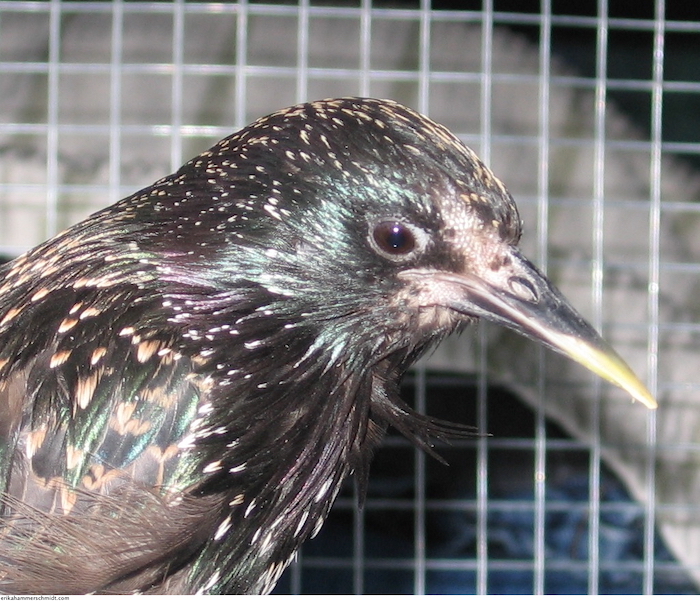
After a year of this, I got an email from his adoptive family.
I had prepared for this like crazy. Before I even knew when or from whom I was going to adopt a starling, I had stocked up on dog food, chicken food, egg powder, applesauce and dried mealworms to feed him, and all the recommended elements of an avian first aid kit. After two failed attempts at buying a suitable cage and one failed attempt at making one, I had managed to put together a pretty good aviary out of chicken wire, latchable dog doors, natural branch perches from a nearby park, and the frame from an old folding wardrobe.
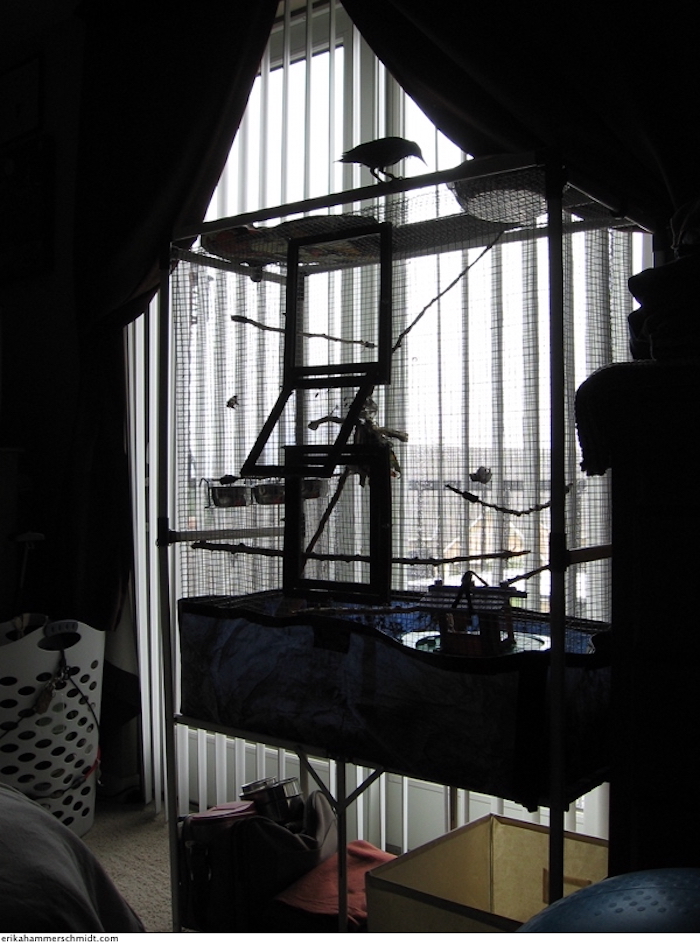
I had even picked a name already. In fact, I'd picked the name years ago, around July of 2010 when John and I were dreaming pipe dreams of moving to Tower, Minnesota and starting an art gallery. I had imagined the focal point of the gallery being a huge aviary with talking starlings in it. They would all be named after stars: Alpha Centauri, Arcturus and Sirius (Alfie, Arkie and Siri for short).
By this time, I had settled on the name "Sirius" for the one starling I could realistically have. Since our Tower fantasy, "Siri" had become an even more fitting nickname for a talking bird, with the 2011 launch of the iPhone 4S. Besides, it was the year of my 32nd birthday, which is 100,000 in binary. The starling I adopted was going to be my extra-special gift for this mathematically significant birthday... and Sirius is a binary star system.
My eagerness was overwhelming at this point. I'd been disappointed once already, when someone in another state had thought she would be able to send a friend to bring me a young bird she'd rescued, but the travel plans fell through and I never heard from her again.
And I was disappointed a few more times as we tried to figure out a date for Marley's adoption. But after two or three rain checks, a woman and two young girls finally showed up at my door, with a frantic little bird scurrying around inside a tiny carrier.
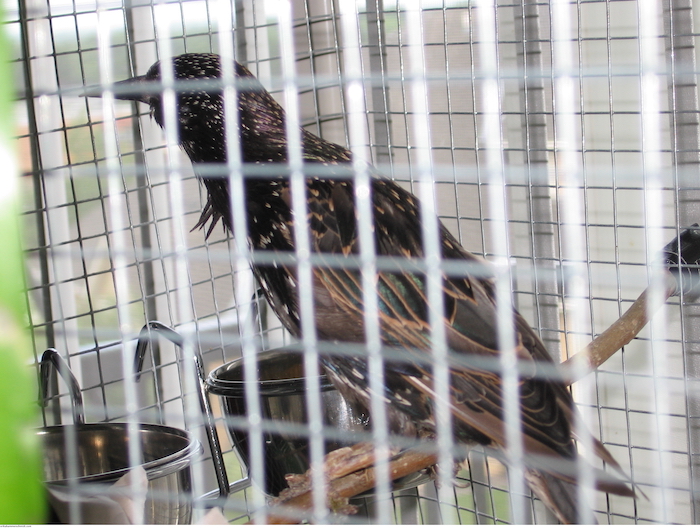
I believe this was the first photo I ever took of him. With effort, we had just relocated the panicked little creature from his carrier into the big cage I'd built for him, and he was perched on one of the branches near the top, getting his bearings.
That was how he entered my life, a nervous and disoriented little thing with bald patches on his face, a funny upward-curling feather under his chin, and chunky overgrown scales on his feet. Sirius Marley Black.
The lady who gave him to me said that he didn't adapt well to new things. Perhaps he hadn't, in her experience. She also said that his previous owner had considered him a not-very-tame bird, but with her, he had opened up and was happy to follow people around and perch on them. Perhaps his personality depends on his environment.
With me, he seemed to adapt just fine. Within an hour of entering his new cage, he took a blueberry from me as I shoved it through the chicken wire. Soon he was eating his ground-up dog-and-chicken-food mix from the bowl, sipping his water, and sampling his applesauce.
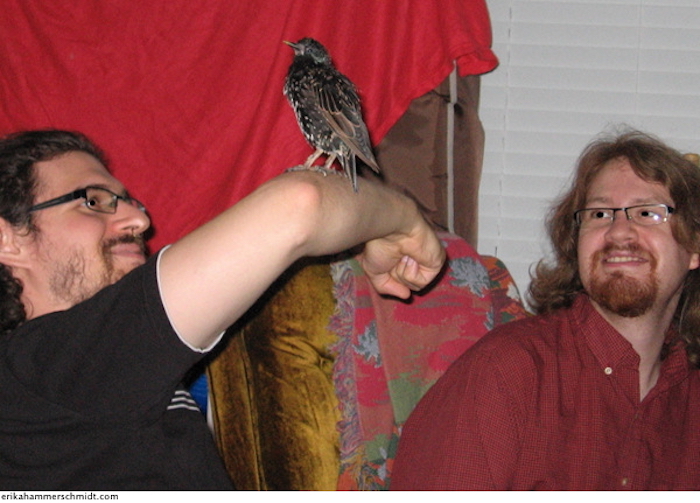
Starlings are extremely social. In the wild, they live in enormous flocks called "murmurations," which move like living clouds. Look it up; there are videos online, and they're amazing to watch.
Sometimes I feel sad that Sirius will never get to be part of one of those. But he doesn't want to; he was raised by humans, and feels that we are his flock.
A starling in captivity is kind of like a human in modern society. Humans, too, are a very social species by nature. Our hunter-gatherer ancestors spent nearly all their time in each other's company. But in modern times, humans often live lives where we spend most of the day alone, or at a job where we do mostly-solitary work. It's unnatural, but we get by. We live for the time when we get off work, and spend the evenings and weekends with people we care about.
Sirius has adapted to a similar life. When we're away, he keeps himself entertained by singing, playing with the toys in his cage, and listening to music I leave on for him. But when we get home, he's always happy to see us.
Within a few days after his adoption, he was tame enough to perch on us and all our friends. Starlings aren't cuddly, but they're very friendly. One day four of us played a game around the dining room table, all wearing safari hats so he wouldn't poo on our heads and get his feet tangled in our hair. He happily jumped from hat to hat all evening. Heads are a starling's favorite perch.
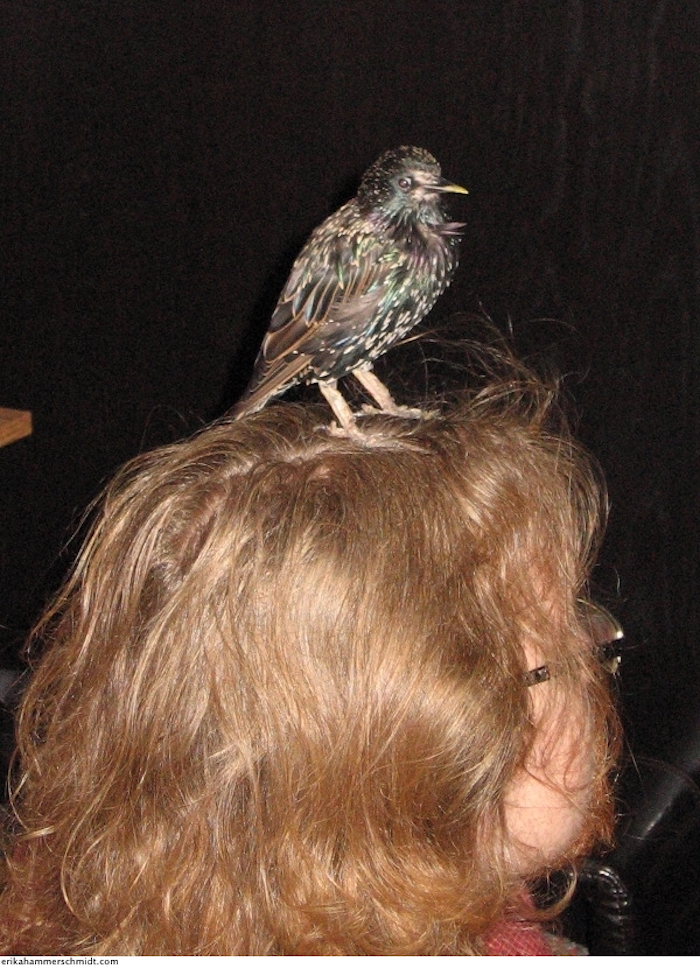
Some starlings will sit on someone's head and act as if they're taking a bath in the hair. Sirius doesn't do this, but water baths are one of his favorite things ever.
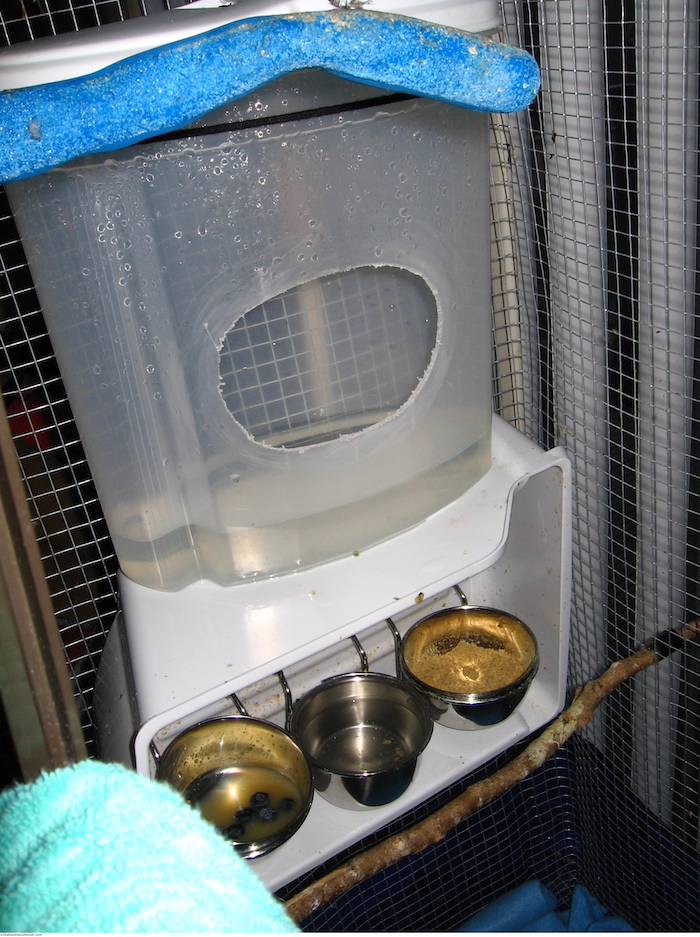
I made a bathtub for his cage out of a big plastic pitcher with a hole cut in it, so he wouldn't get water everywhere when bathing. He uses it often, but he prefers the bath bowl we keep in the shower.
A starling bathing is amazing to watch. It's a blur of fluttering and splashing, faster than a human could ever move-- kind of like a dog that shakes itself after a bath, except the starling is doing it to get wet, not dry. In the absence of barriers, a person ten feet away could feel water drops from it.
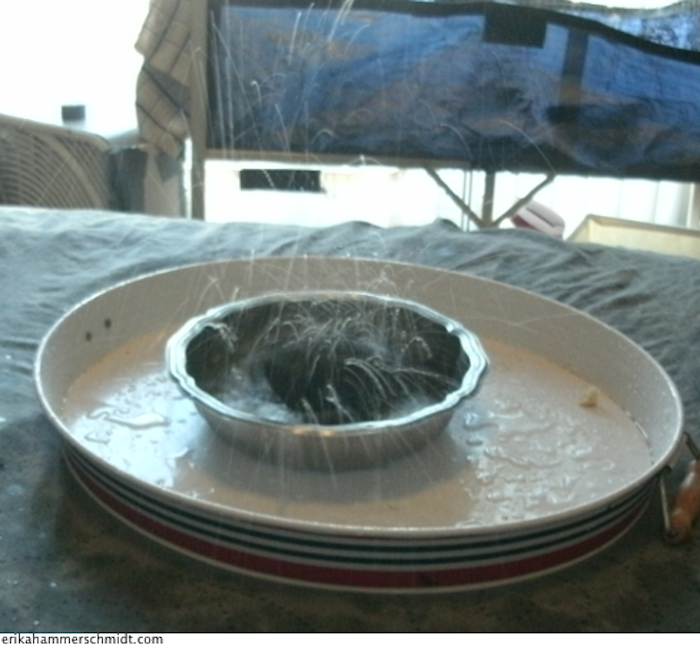
And just as quickly as it began, it's suddenly over, and zoom! The starling is done bathing, and rockets from the bath bowl across the room to another perch. Usually he'll make several flights from place to place immediately after his bath, all with the same sort of frenetic, hyperactive too-fast zooming motion-- maybe as part of his effort to dry himself off. He's on the cage! He's on my head! He's on the cage again-- now he's on the door!
Hyperactive, inquisitive, curious-- that's my Siri. When he's not flying crazily around, he's poking his face into everything, looking for treasure or bugs or whatever. If I'm lying in bed watching a movie, he'll come and crawl all over me, poking his beak at my clothing. He's even tried to look down John's pants.
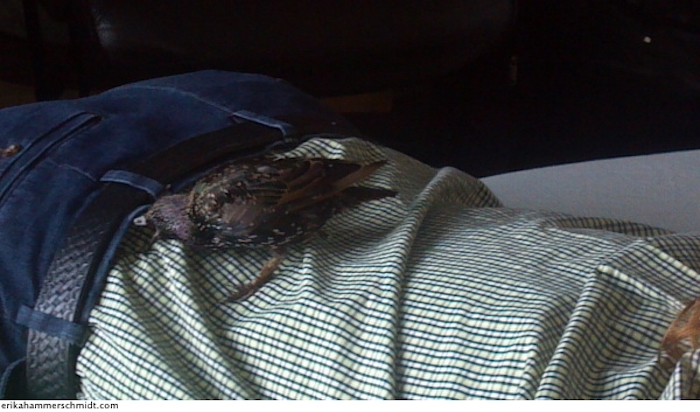
Starlings love to pry things open with their beaks. Folds in clothing, spaces between your fingers, your mouth (especially when you're eating), any small crevice they can find. His favorite toy now is an Advent calendar I got him during the Christmas season. I hide small treats in the pockets, and he happily goes around poking and prying in each one.
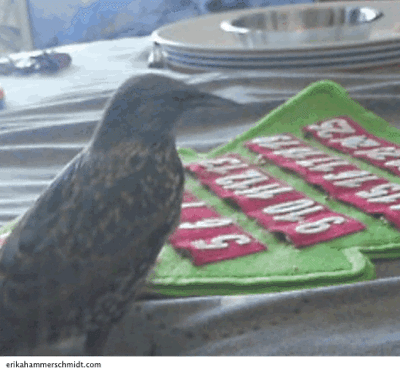
Like most starlings, he doesn't like being touched. He'll cuddle on his own terms: perched on my shoulder, snuggling against my neck, playing with my hair, just as long as he's in control and no hands get anywhere near him.
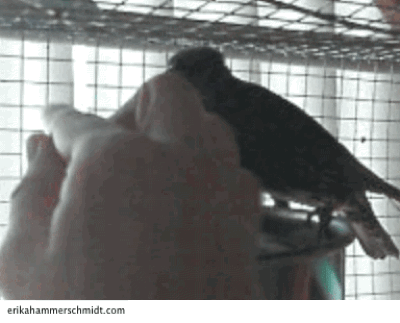
Only rarely will he let me pet him without complaint:
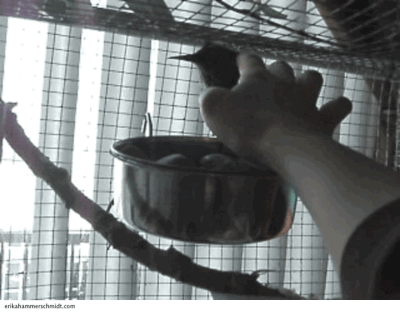
He doesn't always hate hands, mind you; he'll play with them if he is the one doing all the playing. One of his sweetest expressions of affection is to land on my hand while I'm working at the computer, and start poking at my fingers. Sometimes he saves me from wasting my whole day on the internet; sometimes he just messes up my typing.
Poke a finger at him and he'll make the most hilarious sounds of starling rage. A weird thing about starlings: they don't express anger with instinctive sounds natural to their species. They almost always seem to use mimicked sounds. I heard of one person whose starling would make an angry parrot sound she'd learned from the other pets, whenever a finger was poked at her. I heard of another starling who would say the words "I've got a question!" when its nails were being trimmed.
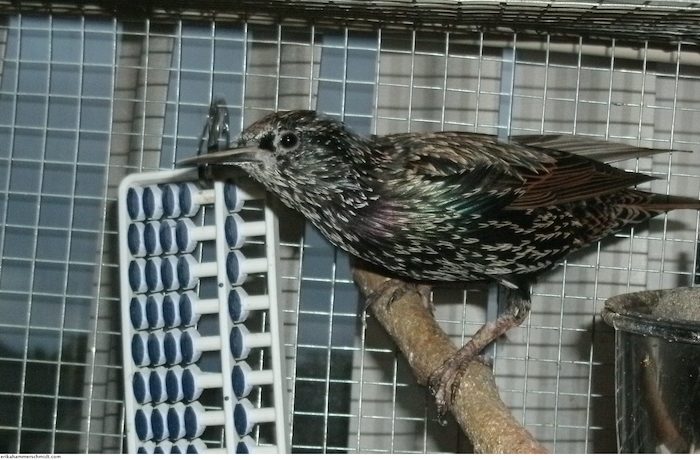
As winter approached, Siri's new plumage came in, and his face was no longer bald. His feet have also become healthier, having shed the overgrown scales with the help of aloe gel rubbed on his toes every day. God, does he hate when we do that! He forgives us afterwards with a grace that Rain Man could never approach-- but when we're doing it, he's a noise-box of angry and adorable protests.
Sirius doesn't have many words to say, and the ones he says are mumbled baby-talk. He says things that sound vaguely like "Hello," "Hi sweetheart," "Pretty bird," "Birdy," "Crackers," and something that might be "Pretty Chester."
We have no idea who Chester is, if anyone. He might have made it up, out of sounds from other words. He does love to rearrange sounds. Sometimes his "Pretty Chester" sounds more like "Poor Chester," sometimes like "Peaches," sometimes like "Purchase," sometimes just the word "chess" amid a bunch of mumbling.
A starling song has some instinctive starling noises in it, mixed with sounds the bird learned from various things in its environment. When Sirius sings , it's a fantastic medley of chatters, whistles, clicks, shrieks, melodic bubbling-water sounds, a phone ring, a dog whine, and some yapping and growling like a little dog that's having a lot of fun playing tug-o-war. Plus a few "Chesters" thrown in here and there.
And, singing or talking, and especially when scolding us for poking a finger in his face, his little pointy wide-open beak is one of the funniest-looking things ever.
If I eat in front of him, he shows an almost hilarious level of greed, zooming to my shoulder and shoving his beak in my mouth to try and get my food. Some foods he acually seems to prefer when they're in my mouth. He'll try to eat anything if he sees me eating it; I have to have my non-bird-safe snacks in a different room.
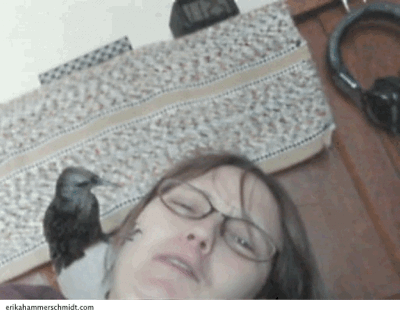
The starling forum recommends a certain diet for adult birds, but it can be varied depending on people's needs. Some feed their starlings the dog food and chicken feed in one bowl, and chopped hard-boiled eggs in another. Some put water in the mix because their birds won't eat it dry. But this is the recipe I use:
2 cups dry dog food. (The protein amount should be in the 25-32% range, and the fat should be in the 10-14% range. Make sure the first ingredient is some type of meat. Poultry is fine; a starling is no more related to a chicken or turkey than you are to a cow or pig.)
1/2 cup chicken feed (the pellets for egg-laying hens, often called "layer mash"-- not the medicated mash for chicks. Yes, starlings can eat chicken food even though they're not closely related to chickens.)
2 tablespoons powdered egg (available in large cans; I use the Honeyville brand. Yes, they're chicken eggs; see above.)
Mix all ingredients together, and blend to a powder in food processor.
Every day, feed two tablespoons of the dry mix in one bowl, two tablespoons of unsweetened applesauce in a separate bowl, and about 2/3 cup of water in a third.
Treats can include bugs, bits of cornbread, chopped nuts, and especially blueberries-- which Sirius attacks and tears to pieces with a frightening level of energy.
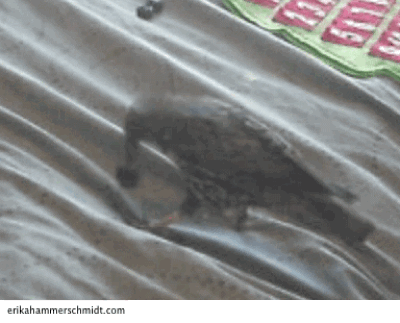
That's the icing on the cake of starling-parenthood joy-- how sustainable it is. A bag of dog food, a bag of layer mash and a jar of powdered egg will feed a starling for a long, long time, saving money and minimizing any effects that pet-food production has on the environment. Starling droppings aren't messy and smelly like dog poop; they dissolve almost instantly in water. I use polar-fleece fabric as a cage liner and machine-wash it. But using your junk mail is fine too; it's free and biodegradable.
Dried crickets and mealworms from a pet shop make good treats, but your free and plentiful household bugs can serve the same purpose. In the wild, starlings eat mostly bugs. (Just avoid any bright-colored ones, which are often poisonous. And stay away from worms and caterpillars; they're the most common things for parasites to lay eggs in. Small moths and beetles are usually fine.)
Even the procurement of the starling itself is earth-friendly. Starlings aren't bred in buildings that draw power, produce waste, and affect the ecosystem around them. They're bred by their parents in nests in the trees. And most starling-keepers don't even upset the parent birds by taking in the baby, because it's usually one that the parents rejected anyway.
Nature can be cruel. In wild bird nests, the smallest and weakest babies are often pushed out, because birds can't afford to expend the effort of feeding unless the offspring shows great promise of survival. Sometimes it's the parents who eject the unwanted baby, sometimes it's the siblings, but almost always it will be pushed out again if someone tries to return it. (This is probably the origin of the myth that birds will reject any nestling that's been touched by humans.)
But even if taking in a starling did reduce wild starling populations, it wouldn't be any kind of ecological disaster, because starlings are not in the least bit threatened. They are a plentiful bird, living on small amounts of plentiful and easy-to-obtain necessities. It's almost ridiculous how small the carbon footprint of a pet starling is.
On Youtube, there are starling-haters who go around posting trollish comments on any cute videos of pet starlings. Things like "I'd shoot it if I ever saw it," and "Starlings are rats with wings."
They're picking the wrong target. Pet starlings are harmless. Fine, so they think wild starlings are a menace to the ecosystem... well, so are humans. Anything they accuse starlings of doing, humans do a hundred times worse. How would you like it if that tired old science-fiction trope played out in your home: an alien appears, recites a list of atrocities committed by humans, and threatens to execute you for the crimes of your species?
Hey, Youtube trolls threatening to shoot someone's cute pet starling-- you are that alien. Our pet starlings don't threaten native birds or eat farmers' crops, any more than you personally have committed genocide. In fact, you should thank us for keeping a starling out of the wild, where you think it will do so much horrible damage.
He likes it better here anyway.
Curing hyperkeratosis
2014/06/22/
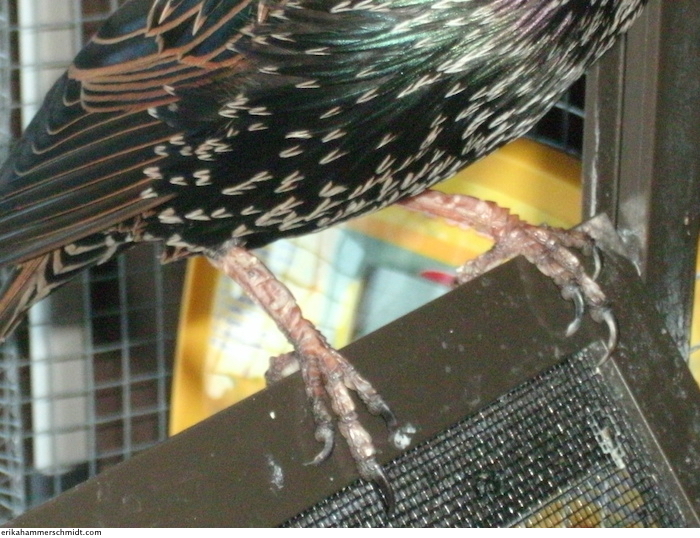
This is a post about the amazing progress we've made on the health of our bird. It goes into more detail about the overgrown foot scales we mentioned before, and the exact process we used for treating them.
If you don't like looking at pictures of scaly bird feet, both healthy and unhealthy, then this post is not for you.
This is where I found out about overgrown scales on the feet of starlings. They can be caused by a deficiency of vitamin A, or a deficiency of protein (which is needed for absorbing vitamin A). They can also be caused by other things that can impede a healthy molt, like a lack of sunlight or bathing water.
It's normal for starlings to shed their scales. I think usually it happens during the molt, and usually just a few scales at a time are shed, over a long period of days, so you wouldn't necessarily notice it. But if the bird is not able to molt properly for some reason (nutrient deficiency or whatever) the scales can get overgrown.
This is the third home Sirius Marley has had, and in his first home he ate a food without the proper ratio of fat and protein. During the time he lived in his second home, he's said to have improved a bit, but he still had insanely overgrown scales when he started living with us.
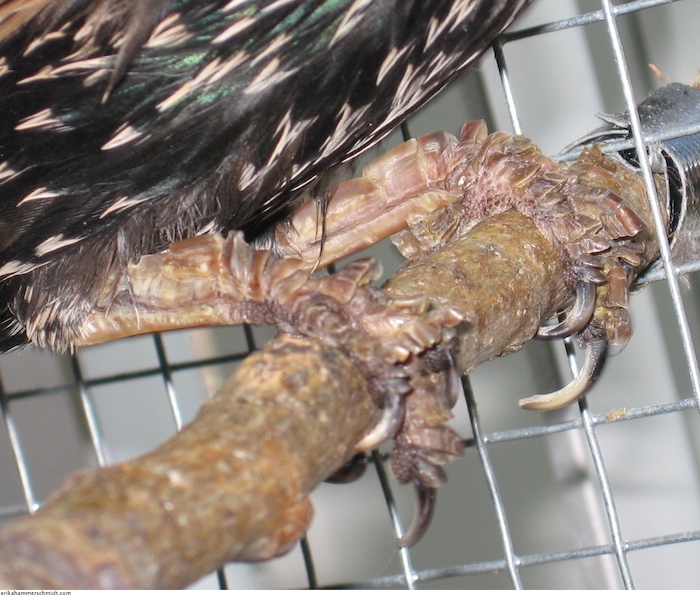
Here are Siri's feet shortly after we adopted him, in July of 2013. He looks like some monster from a video game.
On the advice of some great people on the Starlingtalk.com forums, I started an aloe vera treatment in hopes of softening his scales. Every day, I mix his bath water with a generous splash of aloe liquid , intended as a supplement in drinks. After his bath I catch him and rub his feet with a very pure aloe gel (he hates this, but he forgives me afterwards!)
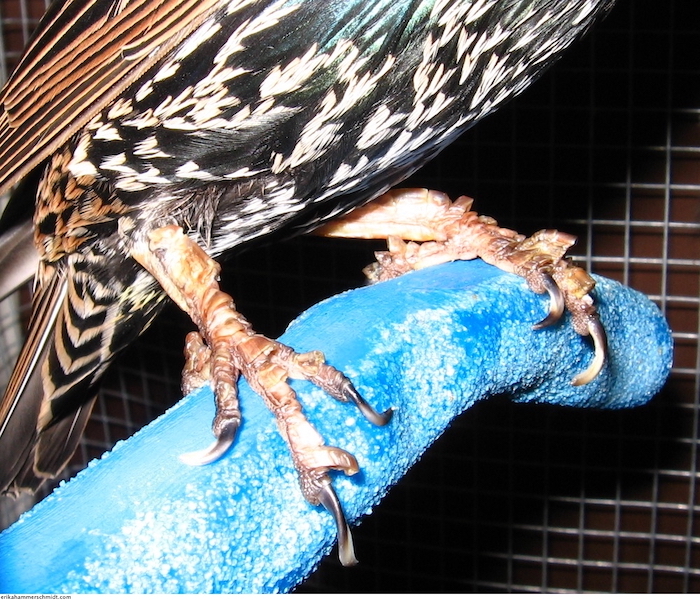
Here he is on September 4th. After a month or so of the aloe treatment, he'd shed a lot of the big scales, though he still had quite a few left-- most notably on the end of his right middle toe and the middle knuckle of his left middle toe.
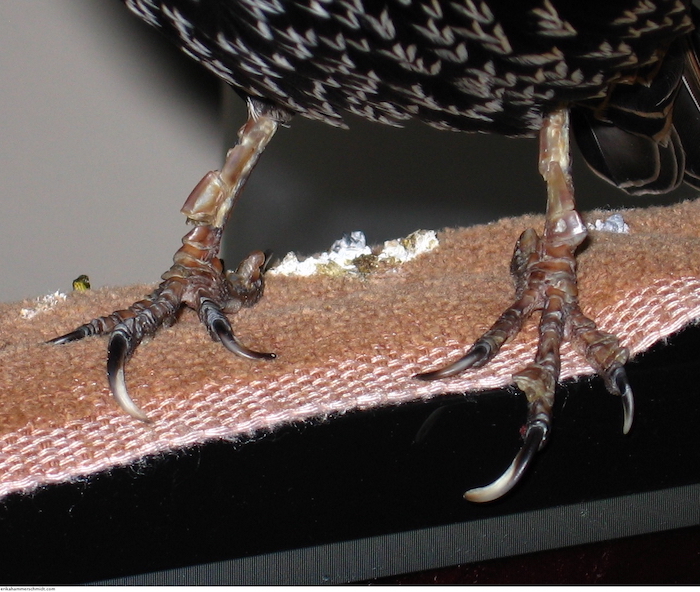
September 20th. By this point he'd shed the long scale on his right foot and the ridiculously tall one on his left foot, but he still had a few stick-out toe scales left, plus the big scales on his legs and the "spurs" on his back toes.
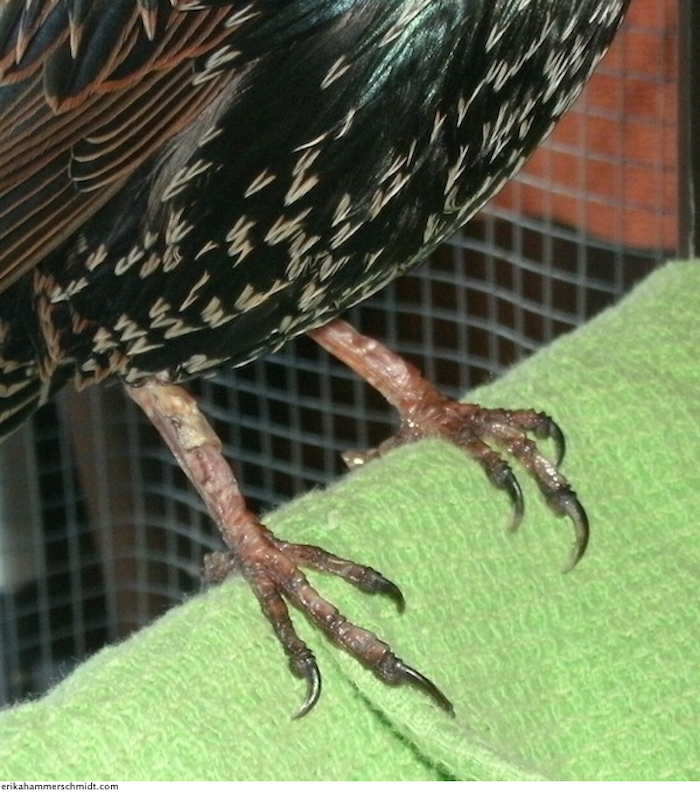
Here he is in December. He had just shed that last big scale on his right leg. It must have been itching, because he was pecking and scratching at his leg, and finally he picked the big scale right off, threw it down and attacked it as if it were a blueberry! He didn't eat it, he just tore it into pieces. I think he was mad at it!
All that was left at this point was a little bit of loose keratin where the big leg scale used to be, and a spur on his left back toe.

January 2014. By this point, he had finally shed both the back-toe spur and the last bit of loose keratin on his right leg.
This marks what I'd call a complete recovery, since all the excess keratin has been shed. Of course, the scales he has now are strangely shaped, from being underneath those big chunky scales for so long. Over his next several molts, they may return to a more normal shape, and if so, I'll post more pictures.
Living Independently: The farm in my window
2014/06/29
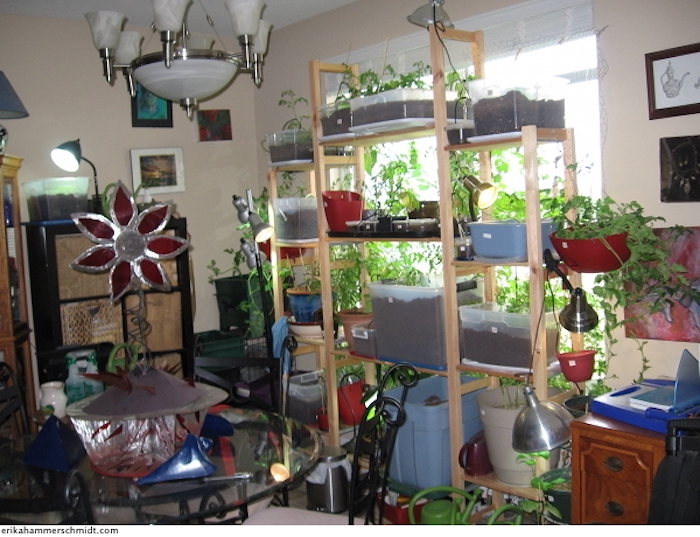
In the world of autistic adults, we keep hearing about the challenge of "living independently." This is used to mean such things as cooking one's own food, shopping, cleaning and maintaining a household, as well as holding a job to support oneself.
I have made unusual progress in that regard. I've had a job for over nine years, and my husband and I manage our small condo in Columbia Heights very well. Bills get paid on time, the place is clean, and we always have tasty and healthy meals to eat.
But, somewhere in the back of my mind, a little voice keeps telling me that this traditional idea of being "independent" is just another way of being dependent.
One of the big disillusionments of growing up, for me, was realizing that almost all my possessions will need to be replaced someday, no matter how durable they seem right now. And worse, realizing that when that time comes, the place I originally got them might not carry them anymore. Stores change out their inventory, and manufacturers discontinue products. As a consumer, I'm at the mercy of the market, and the things I like to buy could stop being available at any moment. Shopping for your own stuff is just a way of being dependent on the people who produce and sell that stuff. Alas, they are not always dependable.
In the same way, having a job is a form of dependence on an employer, who could decide to fire you or cut your hours at any time. There is no way to live independently; everything in the world is interconnected, and everything depends upon other things.
At times, I have very little trust in the infrastructure of society as a whole. At times, it drives me into a panic that I am dependent on a society that is largely unstable and unsustainable.
We all have our ways of coping with this sort of worry. And mine is to take "living independently" to as far an extreme as I can take it. The more self-sufficient my home is, the more I can imagine that I'd be able to survive if society somehow collapsed around me.
I guess, in a way, I'm sort of a doomsday prepper. But most of the time, there's nothing frantic about the process. Making my home as self-sufficient as possible is a pleasant and calming project for me. I feel a great satisfaction whenever I figure out a new way to reuse something, make something from scratch, or substitute a more sustainable alternative for something.
I make my own lip balm from castor oil and a few drops of peppermint oil and lemon oil combined in a glass roller bottle. (Castor oil is sold as a laxative in pharmacies. Scented essential oils are sold in natural-supplement stores; I use peppermint and lemon because I've found that combination helps prevent the lip balm from growing bacteria and starting to smell bad). Sure, I have to keep buying the ingredients, but not nearly as often as I would have to keep buying pre-made lip balm... and I don't have to feel wasteful throwing out a little plastic tube every time.
I make my own spray cleaner with a mixture of water, rubbing alcohol and dish soap. I clean my glasses with a similar mixture that's higher in alcohol, and I re-use cloth lens wipes (though I have to be careful to keep them very clean, because even a tiny grain of dirt on a lens cloth can make a scratch on my glasses).
In the kitchen, I use old washcloths instead of paper towels. I keep a stack of them in one cabinet, and in another I keep an empty wastebasket with unwound coat hangers forming a sort of metal clothesline across the top. When a washcloth gets dirty from cleaning up a spill, I hang it on the wire over the wastebasket, and when they're all dirty, I put them in the washing machine with a generous splash of bleach to kill any germs and fungi.
This system is still dependent on my ability to get bleach, detergent and running water, but it's better than having to keep buying paper towels. I keep a few on hand for guests, but very rarely use them myself.
And, of course, John and I make a lot of our own food from scratch, down to homemade bread, sauces and pie crusts.
But as Carl Sagan said, to really make a pie from scratch you would have to create the universe. No matter how you cook your food, you can't make every part of it yourself. Even if you start with the ingredients exactly as they are found in nature, you still have to get them from somewhere.
That's why I've become a little bit obsessed with making some of my food out of such basic elements as earth, water and air.
In other words, growing a garden.

I'm not an expert, by any means. I'm figuring it out as I go along. And there have been lots of setbacks-- bugs, mold, overwatering, underwatering, plants dying for reasons completely hidden from me. But I keep doing it, because every time I succeed, the joy of harvesting and eating home-grown vegetables-- even just a few-- is well-nigh addictive.
I do grow a few things on the balcony. But the bulk of my veggie garden is on shelves by the window; that way I don't have to worry about the weather, squirrels, or birds (unless Sirius decides to raid the plants someday, but as a mostly insectivorous species of bird, he'd probably eat the bugs on my crops before he'd eat the crops themselves).
The window faces west, not south, which would be preferable. But I still get strong light all afternoon, and I supplement it with several LED lamps plugged into a timer.
It's a pretty simple arrangement. A set of shelves, open on both the front and the back, to allow both me and the sun access to the plants... placed on top of a sheet of plastic to protect the carpet. (I tried forever to find a suitably-sized plastic tray with a lip around the edge, but boot trays were too small, and farming mats designed for livestock were too big. I eventually bought a roll of clear vinyl and rolled up the edges, then clipped them in place with binder clips, creating my own lipped tray... so if a water spill happens, it'll stop when it gets to the edge.)

The plants are growing in a wide assortment of containers. Small plants like basil and green onions are fine with little flowerpots. Bigger things, like potatoes and tomatoes, need larger pots, and for many of them I just used big plastic storage containers. Poke a few holes in the bottom of a storage bin, use the lid as a tray underneath, and you can grow potatoes in your window.
I like to buy heirloom seeds from online suppliers like Seed Savers and Park Seed . If seeds are labeled "heirloom," that means they're meant to be grown for generations, harvesting the seeds from each plant and planting them to start the next season of growth (unlike hybrid plants and some genetically-modified plants that are unable to reproduce). To have a self-sufficient garden, you've got to have reproductively-viable plants.
But the internet is not the only source I get my plants from. Some of them I get totally free. It's surprising how many growable and reproducible plants you can get out of your kitchen waste!
I'm not kidding. Plant the seeds from some leftover cherry tomatoes, and you can grow tons of tomatoes of your own:
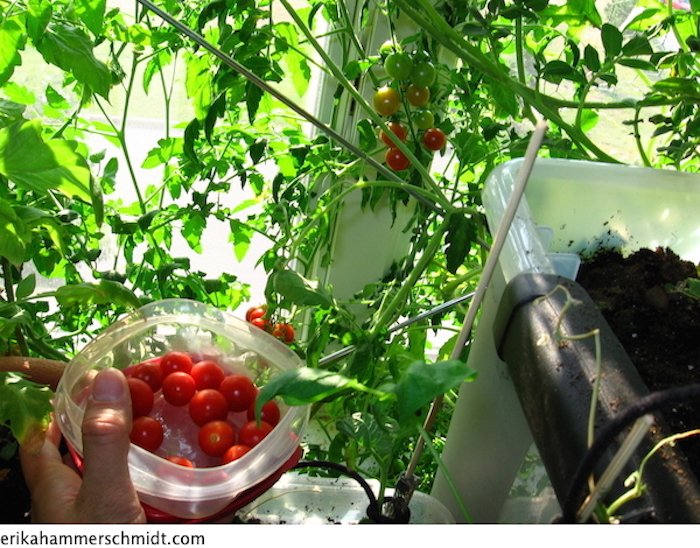
Have an old potato that's sprouting? Cut it into chunks, with about one sprouting eye per chunk. Put a little dirt in the bottom of a big storage tote. Bury the chunks. Water them. As the sprouts grow upward, add more dirt, until you've filled the bin and the potato plants are going crazy with foliage. In about three months you'll be able to harvest your own potatoes:
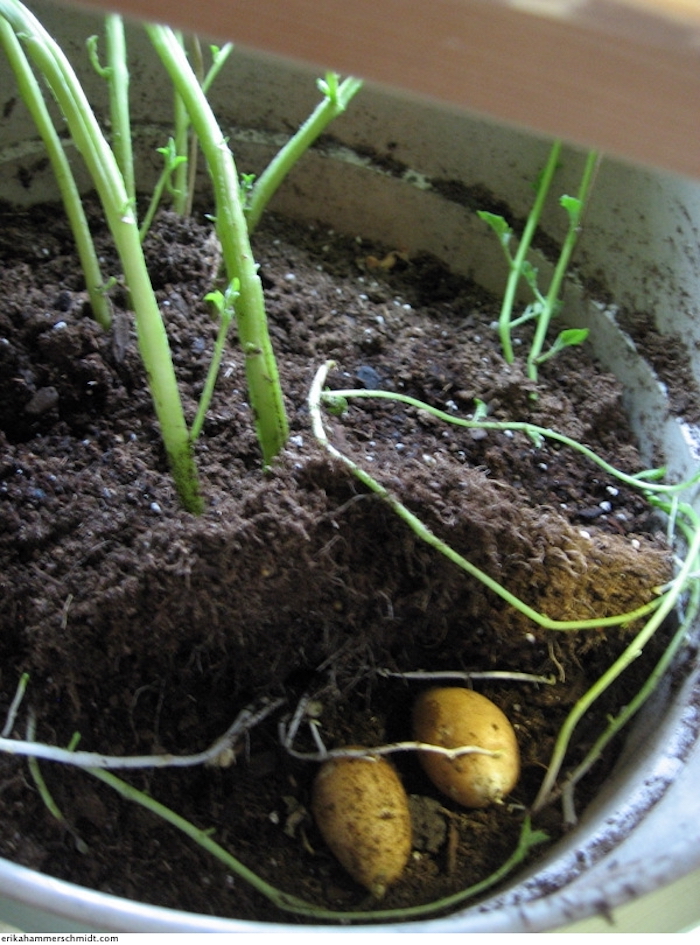
Bought some green onions, chopped up the stems to season your food, and don't know what to do with the little white bulbs at the base? Plant them. They'll grow new stems, and you might never need to buy green onions again:
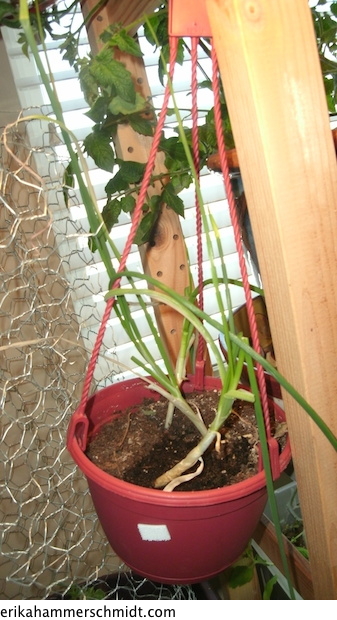
You can even grow your own watermelons from watermelon seeds (not the few seeds in a seedless watermelon-- those are genetically messed-up-- but the ones from a normal seeded watermelon). They're harder to grow than most of my plants, because you have to hand-pollinate them by picking off a male flower and rubbing it against a female flower, and even then the rate of success is pretty low. I never actually got a melon to grow to full size. But I got fairly far once, before bugs ate it. This was before I learned to keep a close eye on the pest population. If I had kept cleaning the bugs off the underside of the melon as it grew, it might've survived.
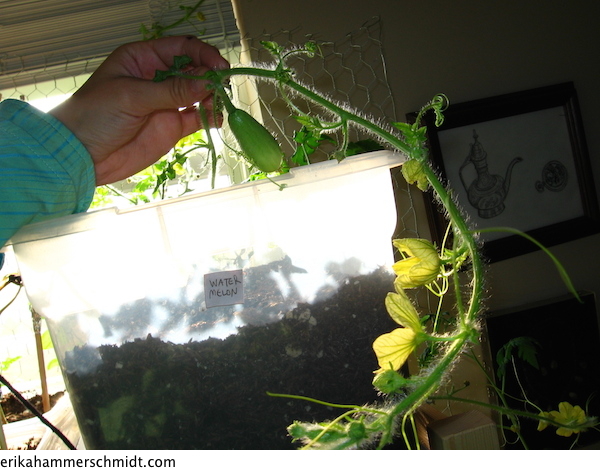
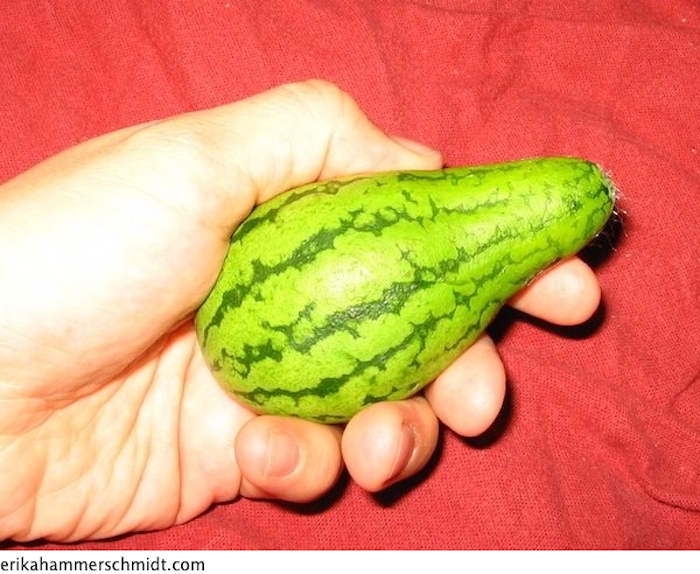
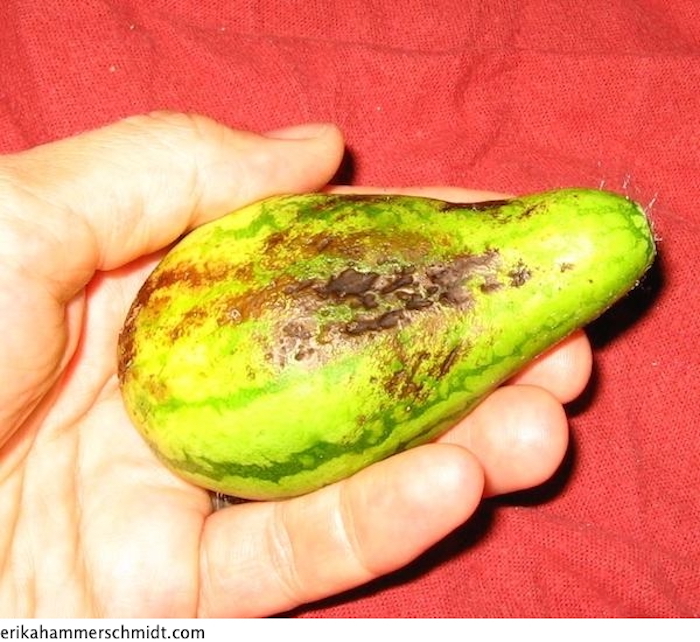
When I first encountered bugs on my plants, I was horrified. I imagined that they were a scourge of the kind you see in movies, like zombies or gremlins, where you have to kill every single last one or they'll all come back and you're doomed.
But gradually I've come to realize that they're a fact of life in a garden, and my realistic goal is not to exterminate them all, but to maintain a balance where there are few enough of them for my plants to stay alive and keep producing food.
I've had little gnats that land on the leaves and appear to suck their juices; I've had some sort of tiny black dots that crawl around and chew holes in the leaves; and worst of all I've had spider mites-- near-invisible tiny creatures that suck the goodness out of my plants, leaving the leaves transparent in spots, and festooning them with little spidery webs in the process.
If a few of these are on a plant, that doesn't mean the plant is about to die. I currently have several bean vines that are suffering from mild infestations, while still growing and producing plenty of tasty beans. It's just a matter of keeping things under control.
This means spraying the plants as a regular part of tending them, not just as an occasional attack to purge the pests. I spray with a mixture of water, dish soap and rosemary oil. Mixed in a regular spray bottle, it's a mild, gentle, and pretty effective pesticide, and it costs very little to make (a few drops of rosemary oil go a long way, and it can be bought from the same supplement stores and online retailers as my lip-balm supplies). I do it whenever I notice new bug damage on leaves, which can be once a week or so. It doesn't eliminate all the bugs, but it keeps them at bay enough to keep my veggies alive.
I also hang fly tape, which is sold at hardware stores: a set of two spools, one wrapped in sticky white ribbon, which stretches across the area you choose and then winds around the second spool. I mounted them on the wooden shelves I use:

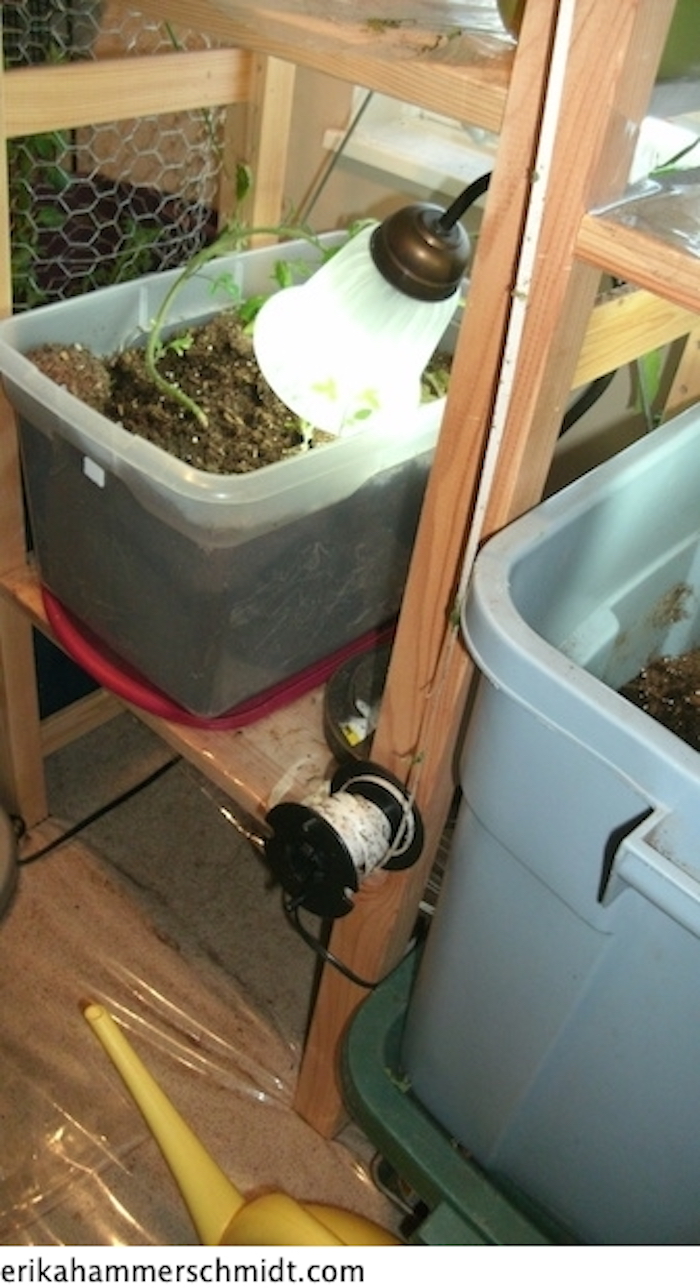
As the ribbon collects flying insects, you wind more of it around the empty spool. It lasts a long time and really helps keep the fly and gnat population down.
Most of the bugs that eat plants won't bite a human, and won't get into your stored food. So, beyond the harm to your garden, which your diligence can keep under control, you don't really have to worry about those bugs being in your house. There are bugs in every house, and the ones that get into your veggie garden are a lesser evil than the ones that eat your clothes, your cereal, or your blood.
Sometimes, though, plants do die, and you just have to let them go and plant something new in the pot.
You can re-use potting soil. It might have bugs, bacteria or fungi in it, though, so it helps to sterilize it. You can put it in some large container with holes in the bottom, put that inside another container with no holes in the bottom, and pour boiling water through it from a big teakettle.
It also may have nutrients depleted from the plants that have grown in it before, so it helps to add fertilizer of some sort. Hardware and plant stores sell good all-purpose fertilizing powders that you can mix with water and use to water the plants.
If you're very ambitious, you can also make your own fertilizer with a composter. The Worm Factory or the Can-o-Worms is a good one. Add red wiggler worms, newspaper, and your biodegradable garbage, and you'll have a supply of nice rich fertilizer in a few months. (They have to be red wigglers, not night crawlers or standard earthworms. And if you can find someone in your area who does worm composting already, it's better to get worms locally than have them shipped through the mail; they're delicate little souls.)
My parents have done this since I was a kid, and they have the loveliest garden. It inspired the title story in my collection "If the World Ended, Would I Notice?"
I don't know if I could support myself with my garden if I had to. It would probably involve starting new plants in every single window and still living on the edge of starvation, if I survived at all. But I take comfort in every new bit of experience I gain in self-sufficiency, every new skill I learn that makes me a little stronger on my own.
I don't think people should stop depending on each other, but I think the world would be nicer if we all learned the simpler and more sustainable-- though less convenient-- ways of getting the things we need. When you have eaten a tiny, delicious bowl of beans that took five plants on your windowsill three weeks to produce, you never look at vegetables quite the same way again.

The cost of good mental health, and my fuel-efficient body
2014/07/06
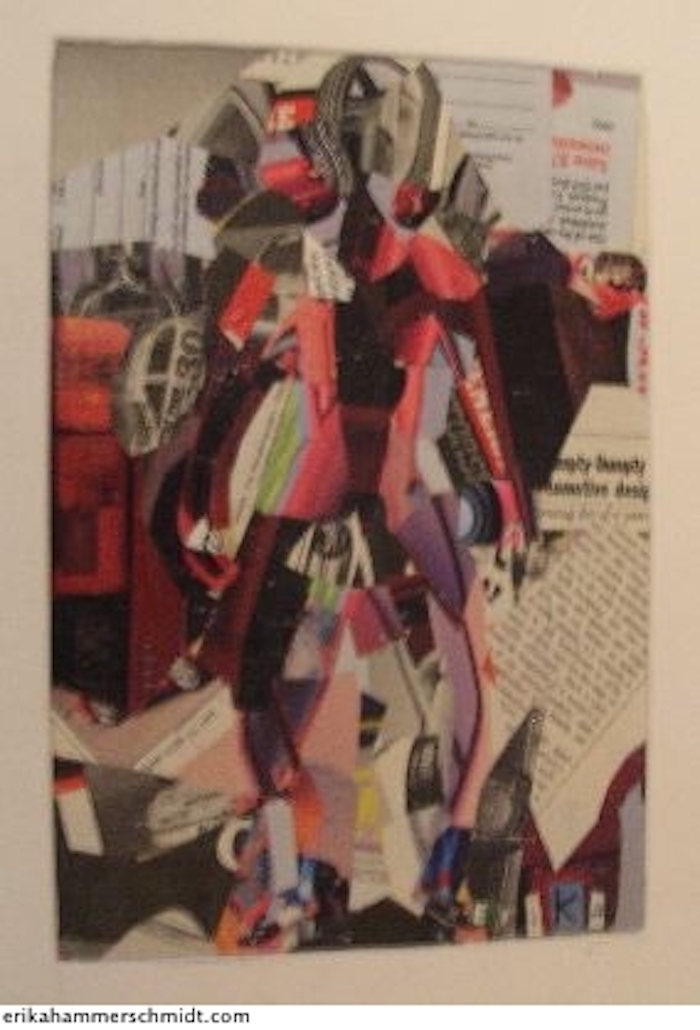
If gasoline is expensive and you have a lot of driving to do, then you want a car that can do a lot of driving without burning much gas. Similarly, if food is hard to get and you have a lot of physical labor to do, then you want a body that can do a lot of exercise without burning many calories...
The rest of this essay has been taken down for inclusion in my next memoir. Stay tuned for updates.
The Alien F-Word, and other twists of science-fictional linguistics
2014/07/13

(Note: In this post, I mention several alien words from episodes of science fiction programs. The shows in question do not always display these words onscreen in written form. Therefore, I may not have spelled all of them in the way the scriptwriters intended. However, since the aliens who supposedly made up the words did not even use the same alphabet I use, my spellings cannot be said to be "incorrect." So bear with me.)
The science-fiction show "Farscape" is not one of the most well-known shows out there, but it has one detail that is familiar to a wide circle of sci-fi fans, even those who have not seen any episodes of it.
That is, of course, the curse word "frell."
In the far corner of the universe where astronaut John Crichton finds himself, this word is used by aliens of all species. "Translator microbes" native to this area make most speech understandable to Crichton, but not certain words. These untranslatables include measures of time, like "arn" and "microt," and measures of distance, like "metra," but also swear words, like "frell."
Which is strange, since "frell" appears to be an exact synonym of the F-word in English. It can be used as an interjection ("Oh, frell!") and as a verb meaning "to copulate with" ("You frelled her?"). It is used in the phrases "Frell you!" (a generic insult), "We're frelled" (we're in big trouble), and "Don't frell it up" (don't make a mistake). It acts as an otherwise meaningless expression of anger or shock, in phrases like "What the frell are you doing?" and "That's frelling stupid."
I cannot think of a single use of "frell" in all of Farscape where our own F-word could not have been substituted. That already strains my suspension of disbelief-- just to suggest that any alien language (let alone all of them!) would have a swear word so close in meaning to ours. But even if they did, then by all logic, the translator microbes should have rendered it as its closest-- really, identical-- English equivalent.
Of course, to keep Farscape an acceptable TV show, they couldn't. But they could have found ways around it. They could have made the usage of "frell" so different from the usage of any English curse that the microbes could reasonably consider it untranslatable. They could have had different alien species use different untranslatable curses, which would have made perfect sense, since their words are presumably being translated from different languages.
And for that matter, make different species use different units of measurement, too! The translator microbes offered the terms "arn" and "microt" for whatever alien measures of time were closest to an hour and a second, respectively. It's possible that these were words they simply left untranslated. But for a unit of time close to a day, they gave the translation "solar day," which suggested that they were trying to convert the aliens' statements of time into terms Crichton could understand. For an approximately year-length period, they said "cycle," which suggests a similar idea.
Unless there was an interplanetary time standard, these measures should have been different from species to species. If aliens, like humans, have one measure of time based on their planet's rotation and another one based on their planet's travel around their sun, then those words would indicate different amounts of time depending on the planet and star system. Any translation method with the goal of making this comprehensible to Crichton should have converted these measures into Earth days and Earth years. If it couldn't do that, then it should have just left them untranslated, giving him different words from each alien species he spoke with, leaving him to ask the aliens for clarification on how much time they meant.
Maybe "arn," "microt," and whatever words were translated as "cycle" and "solar day" actually were part of an interplanetary system of time, agreed upon by all the species in this area of the universe. But that seems improbable; Crichton met groups of aliens that had gone many years with little or no contact with the surrounding planets, and they still used those words.
This is the sort of thing that always keeps me from getting fully sucked into any work of sci-fi, no matter how much I love it. Being a language geek has its downsides when it comes to appreciating fiction.
The "universal translator" in Star Trek drove me crazy. Okay, I'll buy the idea of a machine that can learn to translate languages through exposure to them. It would have to be exposed to a lot of words, in context, along with visual or other physical cues, before it could reliably translate a language. And it wouldn't be able to translate a word it had never heard before, unless there was significant contextual and etymological evidence to suggest a likely meaning for the word.
But a machine that can voice-over the entire first conversation of your first contact with an alien species, right from the first word? Forget it. It's like the science-fiction and crime-drama trope of "enhancing" a blurry photograph. You can use technology to gather all manner of information, but not from a place where that information isn't there to begin with.
It's been suggested that the universal translator actually reads brain activity to figure out languages. But that presupposes that all, or nearly all, intelligent species in the Star Trek universe have brains similar enough that the same brainwave-reading equipment would work on them. It's bad enough that they all look similar enough to be played by human actors, but near-identical brain structure as well? No way! Not when they've canonically got different internal organs everywhere else. It's as unrealistic as the Vulcan mind-meld working on every species. As far as I remember, Picard's Enterprise only encountered two species on whom the translator did not immediately work. That is too high a success rate.
And you may recall that one of those species was met in the episode "Darmok and Jalad." These aliens communicated only through historical and/or literary references, used as metaphors for all the day-to-day situations they encountered. For example, when they were met with a situation of failure, they said, "Shaka, when the walls fell." To express the idea of realization, they said "Sokath, his eyes uncovered!" Picard spends most of the episode trying to figure out what they mean by "Darmok and Jalad at Tanagra."
The thing is, if a species really did communicate this way, their speech would have to have evolved (devolved?) from a more typical language. If you say "Shaka, when the walls fell" to indicate failure, that quotation must have originated in a time when words like "walls" and "fell" actually had individual meanings of their own.
If words no longer have individual meanings, and exist only as parts of metaphorical phrases, then modern people who speak that language have no way of reading the stories from which the metaphors came. So when they use the reference "Shaka, when the walls fell," they can't actually have the image of Shaka's falling walls in their minds. To them, that series of syllables means nothing but "failure."
These aliens' culture has apparently changed until they say "Shaka, when the walls fell" when the thought in their mind is just "I've failed" or "We are going to fail." So why doesn't the brainwave-reading universal translator render their words as an expression of the thought they're actually having? I mean, English speakers say the word "goodbye," which is actually a shortened version of the phrase "God be with you," but most of us don't know that, and when we say that word, we're not always thinking about God actually accompanying the person we're saying it to. I'm pretty sure a universal translator aimed at an English speaker would not give a translation of "God be with you" for every instance of "goodbye."
I try to spackle the plothole by assuming that this species actually had two languages: an informal language for use at home, with individual word meanings and everything, and a formal language for polite company, composed entirely of metaphors. But it's still weird that they wouldn't try using the informal language, when their attempts at talking to Picard in the formal language kept falling flat like Shaka's walls.
Even in my favorite novels, this language thing can ruin pieces of the story. Charles Sheffield is wildly creative when it comes to making up aliens, but his names for them are inexplicable. A member of a species that communicated only through smell was somehow named Atvar H'sial, a sound-based name that she could obviously neither say nor hear. A team exploring an unfamiliar planet found two heretofore unknown species, which communicated through high-pitched shrieking. Upon learning to communicate with them, the language expert reported that they were called the Coromar and the Maricore. I can only assume the linguist was making that part up, because their language did not contain the sounds necessary to form those names, and there was no other species around to name them.
It's like Spock and his mind-meld in "The Devil in the Dark." How could that blobby creature tell him telepathically that it was called a Horta? How could it be called a Horta? Did it have a spoken language with human-pronounceable words, and did it, for some reason, just never attempt using that language with the humans? Did it have a sound-based language that wasn't human-pronounceable, and was "Horta" just as close as Spock could get to saying its word for its species?
Or was "Horta" a translation of some word in its non-sound-based language-- a language based on smells or touches or ground vibrations or electromagnetic waves? That wouldn't make sense either. How could a non-sound-based message translate into a particular series of meaningless syllables? (My pet theory is that it's not meaningless: perhaps the creature's name for itself literally means "garden" or "cultivation" in its language, so Spock translated it into the root of the English word "horticulture." But that doesn't make much sense either; why would a subterranean rock-being associate itself with gardens?)
It's not just the aliens who speak unrealistically in science fiction. Star Trek is set about 200 years from now, but the people use pretty much modern English. (Or rather, English that changes depending on the year of filming. In episodes of The Original Series, I catch the occasional phrase that I suspect is 1960's slang, like when a minor character in "The Enemy Within" reports to Scotty that he has fallen down, using the words "I took a flop.")
This is, of course, a flaw of nearly all science fiction. It's fair to assume that people two centuries from now will be speaking something as different from present-day speech as present-day speech is from what people were speaking two centuries before now. (When I was a kid, I thought the changing of language might stop with the current generation, because we've gotten so good at writing things down and documenting what the correct spelling, grammar and usage is. But as I grew up, I realized our technology was speeding the changing of speech more than it was slowing it down. Centuries ago, it took newly coined words a long time to spread. Now, a new word or phrase can span the globe in a matter of days, when a few influential people use it on social media.)
Of course, I can give Star Trek the benefit of the doubt and assume that people in this future really are speaking drastically evolved languages, and it's just being translated for the benefit of the listener (in the same way I can read a novel set in France and understand that the characters really are speaking French, even if their words show up in English on the pages).
But still, when I'm engrossed in a foreign or futuristic story, the spell can be broken for me by something as minor as a character making a bunch of puns. I have to stretch my suspenders of disbelief to imagine that all the puns work in both modern English and their language! But at least I can try and pretend that the puns they actually used were translated into somewhat similar puns in English for my benefit. It's worse when a major plot point hinges on a character misunderstanding another's words in a particular way; then I can't pretend that it was just a similar thing, I have to accept that the words have that same double meaning in both my language and the characters.'
There is no perfect solution to this. Misunderstandings, and puns as well, are part of life. A story without them wouldn't be realistic. And you pretty much have to write your dialogue in such a way that readers will understand it. Few audiences are willing to learn a new language, or even a drastically altered version of an old language, just so they can read a story.
Authors just have to do their best, and learn from their mistakes. In "Kea's Flight," I had the characters speak pretty much present-day English, suggesting that the natural development of language had been stunted by the control of a totalitarian government. Looking back on it now, I feel that wasn't quite enough reason for the language to remain as unaltered as it did.
I think I did a better job with "Furnace," my short story in the anthology "This is How You Die." In it, I described a future so distant that our descendants have evolved not just linguistically but physically, and their concept of wordplay has been shaped by the heightened abilities of their minds and bodies. They are explicitly stated to be speaking a future language, not English, and their puns are left somewhat to the reader's imagination:
In the Pnn-kiai language, the sentence she had just spoken was an aural palindrome: recorded and played backward, it would sound the same. Skeeiao had always been a lover of wordplay.
I'm not saying that was a perfect solution either. There are very few works of fiction that have handled this sort of thing in a way that truly impresses me. The "Ender's Game" series tried to have young characters using an occasional future slang word, but mostly it seemed like an afterthought. "1984" came up with the innovative idea of Newspeak, but, for the sake of readability, had to relegate it to the status of a work in progress, a language-in-the-making that nobody actually spoke yet.
For an example of future speech that's different enough to be believable, but familiar enough to understand, I have to recommend the movie "Demolition Man": a futuristic vision that's a comedy on the surface, but has much deeper and more well-thought-out worldbuilding than most viewers realize.
Grocery list lifehack
2014/07/22
Here's an idea I had for a grocery list that's reusable and also reminds you what things you might want to put on it.
You just need:
sticky labels
scissors
two large strong magnets
strong tape, like Gorilla Tape
many small magnets
(or a magnetic craft sheet and scissors to cut it apart)
a thin marker or pen
a rectangular cookie or candy tin
Tape the strong magnets to the bottom and top of the tin.


Stick the small magnets inside the bottom of the tin. Cut small pieces of the sticky labels and stick them inside the top of the tin. Write down all the groceries you commonly buy.
When you're ready to go shopping, put a magnet next to each item you plan to buy this time. If you're not sure what you need, skim the list and let it remind you.
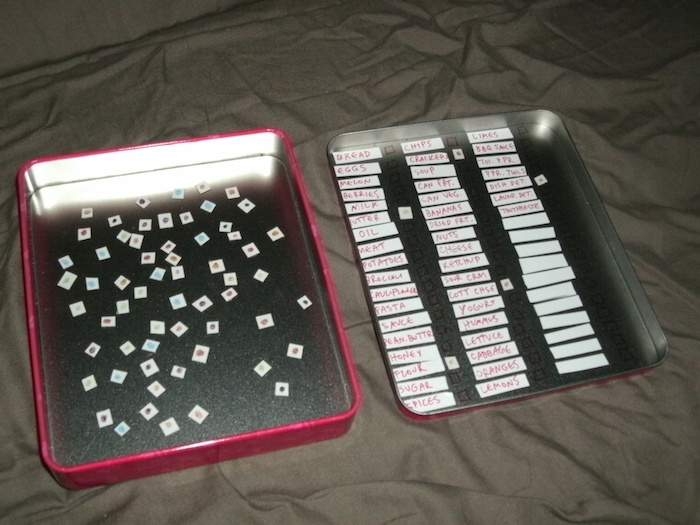
In between shopping trips, you can store it on your fridge:
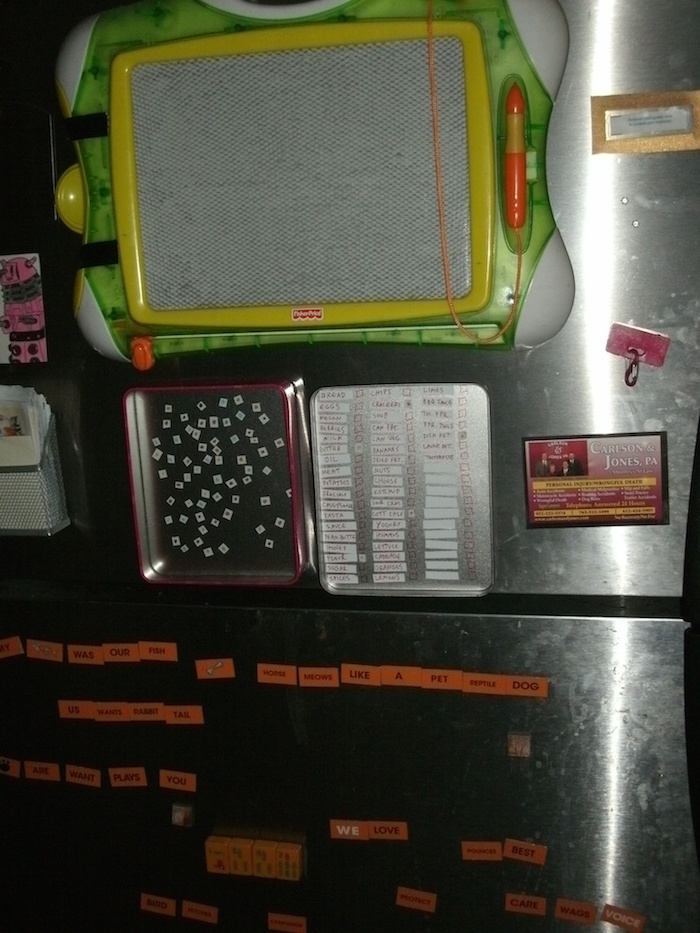
And when you go shopping, just take it down, close the tin and take it with you:

What Data meant by "emotionless": The mind and body of feelings
2014/08/03
When John and I sat down and watched all of "Star Trek: The Next Generation," the thing that most consistently strained my suspension of disbelief wasn't the faster-than-light travel, the plethora of humanoid aliens, or the idea of Wesley being allowed on the bridge.
It was Data the android. Not because he was an intelligent machine, but because he claimed to have no emotion.
He functioned, in all the most important respects, exactly like any creature with emotion. He made efforts to preserve his own life. He showed loyalty toward some people and distrust of others, and seemed to prefer the company of certain people. He was constantly motivated to seek new and interesting experiences. And on top of it all, he said, outright, countless times, that he had a desire to feel emotion.
At the time, I couldn't find any way to spackle this gaping plothole. Desire is typically considered an emotion-- one of the strongest and most important.
In fact, if you're a conscious being, capable of making your own choices, you have to have the emotion of desire. That's because all choices are caused by desire. I've analyzed hundreds of the choices I've made, and every single one was made because I either wanted it, or wanted something I could get by doing it.
I don't often make absolute statements, but I'm pretty sure it's impossible to make a choice for any reason other than desire. Even if you do something because someone has a gun to your head, you're still choosing to do it because it's a means to the end of staying alive, which is something you presumably want. Even if you did something totally pointless that gained you nothing, just to prove you could, it would still be because you wanted to prove it.
So, I thought, if a creature that behaved like Data truly had no emotion, then he would not be a conscious entity. He'd be an automaton, programmed with an assortment of stock responses to an assortment of types of situations that his creator imagined he might face. Complicated, yes-- it would take an enormous number of pre-programmed responses and simple algorithms working together, to simulate sapience as well as he does. But not truly conscious. The choices he made would actually be the choices of the person who programmed him. The prosecutor in "The Measure of a Man" would have been right about Data: he would not be a sentient being.
Even when depressed people enter a phase of "emotionlessness," they still have the basic emotion of desire, on a few of the most fundamental issues. When they are unable to feel most of the emotions in their day-to-day lives, they can get bored and exhausted with this life of doing things they don't care about. Sometimes the desire to stop the pointless routine becomes so strong they commit suicide. Sometimes they press onward and keep going through the motions anyway, because they want to avoid making other people sad-- which is also a desire.
If you were capable of conscious thought, and not controlled by anything, but you were incapable of feeling desire... then you would do nothing. You wouldn't go to work, because you'd have no desire to make money and keep your home. You wouldn't respond to requests, encouragement or commands from other people, because you'd have no desire to please them or avoid their retaliation. You wouldn't eat or drink, because you'd have no desire to stop being hungry or keep being alive. You'd die soon, but you wouldn't actively kill yourself, because you'd have no desire to die. If you had no desires, you would absolutely not give a crap either way about anything .
But maybe desire isn't always an emotion.
How do we define "emotion"? Lately I've realized that, for my whole life, I've been defining it as "any state of mind that can be described using the word 'feel.'"
I've been using the word "desire" for the condition where your chest feels tight and you have to force yourself to breathe and your muscles are cramping with the effort to hold them back from trying to grab what you want... and I've also been using it for the condition where, rationally, you realize that the thing you're reaching for is more likely to contribute to the achievement of your long-term goals than the alternative.
In either case you can say that you "want" the thing, or "feel a desire" for it. But maybe those two cases aren't just different degrees of the same emotion.
What is emotion? It's partially a mental condition. Mentally, you realize that you want something-- to run away from danger (fear), to fight your enemy (anger), to be close to your loved ones (affection). It's like a thought, but one that's not necessarily put into words.
Usually, you don't give conscious thought to why you want the thing. If you analyze it, you'll almost always find that you want it because you think it will make you more happy than the alternative-- "happy" being perhaps the only emotion that isn't a form of desire.
Then again, maybe sadness isn't a form of desire, either. It goes along with a wish for things to be better, but the sadness itself is focused on the feeling that things are bad right now. Most feelings involve motivations, but the mental portion of happiness or sadness could be described instead as an opinion: it's the opinion that things are bad right now, or the opinion that things are good.
But for any feeling, in addition to the opinion or motivation itself, there are all the physical symptoms that go along with it.
When I try to imagine what fear feels like, my sensory memory supplies a pounding heart, cold limbs, muscles on a hair-trigger, ready to run or jump, and a slight tingly pain on the skin from the rush of adrenaline. Love feels warm, with a relaxed sensation, a swelling of the chest, and a different skin tingle that seeks touch. Anger is tight-chested, with pressure in my head and an ache in my cheeks and eyebrows, and the reflex to clench every muscle.
But what is an emotion, aside from a motivation or opinion and the body's response to it? Is there anything beside those components?
I try to define what fear feels like, besides the opinion that I'm in danger and the motivation to save myself. Besides that, all I can think of are the physical sensations, ebbing and flowing in response to my thoughts about whatever I'm afraid of.
Every time I analyze a particular part of how an emotion feels, I realize that it's a sensation of the body, not the mind. The only parts that aren't physical are the thoughts that the situation is good or bad, and that I need to do something about it.
Maybe that's what emotion is: the synergy of the mind's part and the body's part. Maybe the Tin Man was right: maybe you do need a heart to feel love.
Maybe it's no accident that we use the word "feel" for both emotions and physical sensations.
I think Data had the "opinion and motivation" part of emotion. Probably he was programmed to have it. He considered some situations bad and some good, and he tried to seek out the good ones. And that couldn't have been based only on logic, because if you try to base your desires only on logic, you eventually reach a question you can't answer.
Why do I want to fight that alien monster?
Because if I don't, it could kill my captain.
Why do I want it not to kill my captain?
Because he is valuable to the Federation.
Why do I care if the Federation loses a valuable captain?
Because anything that weakens the Federation threatens the political stability of the galaxy.
Why do I care about the stability of the galaxy?
Because instability could kill millions, including me and everyone I know.
Why do I care if everyone dies?
Because that would be terrible.
Why do I consider it terrible?
...I don't know. I just do.
Logic is a way of deducing conclusions from premises. It can't choose which premises you start out with.
Data seems to have had a few basic motivations, probably programmed into him by Dr. Soong, from which he reasoned all his decisions and conclusions. Basic motivations like "I must protect life." He couldn't logically explain why they made sense to him; he felt them in the same way we feel an instinct. But despite this, he still didn't consider himself to have emotions.
Maybe it was just because he didn't have an organic body. When something bad happened and he recognized that it was bad, his brain couldn't respond by pumping his body full of the hormones of fear or anger or sadness. He couldn't feel the part of emotion that goes beyond opinion and motivation: the accelerated heartbeat, the tingles, the muscle tightness, the building of tears in the eyes. I think that was what he meant when he called himself emotionless.
Maybe the "emotion chip" he eventually got was a simulator that fed his brain the sensory feedback of an emotional body.
I was thinking about all this because I sometimes feel a bit guilty when I see something terrible in the news and don't have a strong emotional reaction to it-- because it's too huge to process, or because I've been desensitized by reading so much news, or whatever causes those unfeeling moments I have.
But even when that happens, I still have the opinion-and-motivation part of emotion. I believe that what happened is bad. I experience a desire for it not to happen again. I do what I can to help prevent it.
And maybe that's enough.
Data didn't have the physical component of feeling. But he was a moral person. If a crewmate died, he didn't feel a pang in his heart, a tightness in his throat and tears welling up in his eyes. But he still did everything he could to prevent their deaths. His desire to save them wasn't physical, but it was strong-- he prioritized it above other, less important things that he also valued.
So, if you do good things not because you love it, but because you believe you should... if you help others and protect civilization because you believe it's the right thing to do, even if your heart doesn't hurt when imagining the alternatives... if you see tragedies on the news and you don't react by crying or clenching your teeth, but you still donate to charity or call your congressman to fight against those tragedies... then you don't need to feel ashamed at not feeling the expected emotions. Data was one of the good guys, and you're at least as good as he was.
A Bridge in Time
2014/08/06/
I've been thinking about how strange it is that our sense of time can tell us, simultaneously, contradictorily, that the same period of time has felt both longer and shorter than it actually was.
Recently I saw a mention of the I-35W bridge collapse on TV. I was barely paying attention, and at first thought it was talking about a new bridge collapse. Once I figured out that it was actually referring to the anniversary of the old one, I started wondering how many years it had been.
Looking it up was a shock. My memory had stored that event as if it were very recent: I would not have been surprised to find out that it happened last year. But 2007? Seven years ago? For a few minutes I was convinced that Wikipedia had a typo.
I spent a while wondering how the last seven years could have flown by so fast. Was my perception of time speeding up that much as I grew older? Was the rest of my life going to slip through my fingers as if it were just a couple years?
Then I started thinking of other things that happened around the same time.
My book, for one. My memoir "Born on the Wrong Planet," first published in 2003 by Tyborne Hill, was republished by AAPC in the year 2008... the year after the bridge collapse.
That republishing, though more recent, feels much longer ago. Six years feels about right to me, if not a bit short. The switch from my old publisher to my new one feels like a long-ago stage in my growth as a person; a scene from an earlier era of my life.
Why does the bridge collapse feel more recent to me than AAPC's publication of my book? Was it because it's a more important event? Yes, we do tend to say things like "it seems like just yesterday" when talking about memories that are important to us. And yes, objectively I realize that the bridge collapse was a more important event, affecting more lives more severely, than any event in my own life.
But in terms of my own emotional reaction to it, my brain does not seem to perceive it as more important than my book publication. It's hard to react emotionally to a disaster that kills hundreds, when you see such disasters on the news every day. Exposure to the constant violence and destruction of real life will desensitize you faster than any gory video game or horror movie. The emotions close off as a defense mechanism.
I didn't personally know anyone who was killed or injured in the bridge collapse, so my mind filed it as just another in a long line of deadly catastrophes on the news that my emotions couldn't keep up with. So why, I wondered, was it so fresh in my mind, while the republication of my book-- a deeply emotional process for me-- seemed so long ago?
I think my mind measures time by change, not by actual passage of time. After all, change is the only way we really can measure time: the change of the seasons, the motion of the sun and moon and stars, the progress of the machinery in a clock. By observing how much things have changed, whether it's the position of the clock's hands or the color of the leaves, we get an idea how much time existed between now and the last time we checked.
The switch to the new publisher was an event in my own life, so I measure the time since it by how much I have changed. The bridge collapse was an event in the history of Minneapolis, so I measure the time since it by how much Minneapolis has changed.
Minneapolis is certainly a bit different now from how it was in 2007, but it's stayed more the same, overall, than I have. Or maybe I notice the changes in myself more than the changes in my city.
I don't know. I just know that my sense of time doesn't provide a general feeling of time flying or time crawling for "the last seven years," or "this past week," or "today." Instead of consistently judging that a certain period of time went by "fast" or "slowly," it measures my perceived speed of time differently depending on which event I'm counting from.
It's not really perceiving the speed of time; it's simply tagging various memories as "recent" or "long ago," with seemingly little regard for how long ago they actually were.
If it chooses these tags based on how much change has occurred in the relevant area since the event, that's why the same period of time can feel like an eternity or an eye-blink depending on which memory I'm recalling.
The more a thing changes, the more time passes for that thing. A new form of temporal relativity, perhaps.
ALS Ice Water Challenge
2014/08/18/
I first learned what ALS was, when I was a kid in the car with my parents, driving past this old landmark:

I asked what the letters in the sign stood for. My parents explained both meanings (though I'm sure the builders of the sign didn't have Lou Gehrig's Disease in mind).
I kinda wish this place was still in business, so I could go there, order a glass of ice water, and pour it on my head.
Oh well. Might have to make do with Al's Breakfast on University Avenue.
Sirius the Starling takes the Ice Bucket Challenge
2014/08/25/
So Sirius stepped up and tried it.
He'll take a bath in ANYTHING. Well, almost anything. Maybe he had to wait until the ice melted; so what. He's adorable.
Otherkin
2014/08/31/
I have occasionally described myself as an alien.
And lately I have spent a significant amount of time on Tumblr (where all genders, orientations, and other forms of identity are accepted and defended, and furthermore, there are new and unusual identities gaining recognition all the time).
So I'm sure some people are wondering what my opinions are on the phenomenon of "otherkin."
That question encompasses several questions, which I'll try to answer one by one.
1. How do you define the term "otherkin"?
As I understand it, otherkin are people who experience a feeling of being something other than a human, trapped in a human body.
2. Is it real?
Of course. It's a feeling, so, if people feel it, then by definition it is real.
3. Is it just a feeling? Or is it really what people say it is?
If you mean being a literal reincarnation of some animal, a literal descendant of some alien, or a soul that some supernatural power literally placed in the wrong body... then, in my opinion, no.
However, I don't find those ideas any more unlikely than the claims of mainstream religion.
To people who earnestly believe them, I extend the same respect and tolerance that I extend to religious people, as long as they aren't using it as an excuse to hurt others.
You don't have to share people's beliefs to respect their feelings.
4. Is it comparable to being transgender? (In other words, is it the same type of feeling, and of the same strength?)
Without having had both those experiences, I can't give a confident answer to that.
I'm not telepathic. I can't know for certain what another person feels, or how strongly.
I can only make guesses based on people's words and actions.
From observation of words and actions, I'm pretty sure there is a wide variation among individuals, both transgender and otherkin, in terms of how strongly they identify as such.
In both groups there appear to be some who identify with the group consistently and strongly throughout life, and others who identify temporarily and less strongly while they are growing up and trying to figure out their own identities.
Is the consistent-and-strong identification more common among transgender people than among otherkin? Yes, from what I can tell.
The recorded history of the transgender movement gives lots of evidence of transgender identity being felt very strongly, often to the point of undergoing major surgery, and risking one's job, relationships and even survival for the sake of expressing one's identity.
There's less recorded evidence of otherkin going to such extremes.
However, to be completely open-minded and scientific, I have to consider the possibility that this is because otherkin are less common overall, or because they have not had communities that recognized the existence of their identity until the last few years.
And otherkin (or possible otherkin) are not completely absent from recorded history: there is, for example, the 1987 case of the Leopard Man of Skye.
Also, even if the experience of being otherkin is generally much less strong and enduring than the experience of being transgender, that doesn't mean it is undeserving of any respect at all.
5. Should we demand respect and recognition for otherkin, in the same way we demand it for transgender and gay people? Or would that harm the social justice movement overall by causing people to take it less seriously?
I can see both sides of that. On the one hand, I would find it very hard to argue that any group does not deserve respect and acceptance. But on the other hand, I'm not sure society as a whole is ready to accept otherkin.
And, if otherkin associate themselves with the transgender movement by using some of the same terminology and rhetoric, it's possible that could cause setbacks for society's willingness to take transgender people seriously.
Society is starting to accept gay rights, transgender rights, women's rights, and racial equality. That's a great thing, and it would be terrible to lose that progress by pushing demands for more acceptance on society faster than it can adapt.
I'm not saying that people *shouldn't* be ready to accept all non-harmful forms of self-expression at once. I'm saying that, in reality, they aren't... and, however unfair it may be, the success of all the various human-rights movements depends on society being ready to accept them.
So maybe we need to wait a while, in the same way that we're not going to start fighting for the right to polyamorous marriage while we're still struggling to get gay marriage accepted.
But, even if that's the case, it's not a question of whether otherkin deserve acceptance; it's a question of whether it's feasible at this point in time. I'm all for accepting everyone who expresses their identity without hurting other people with it.
6. Do you identify as otherkin?
I can see how people could get that idea, since my first published book was literally titled "Born on the Wrong Planet." But no.
As a teenager, maybe even as a college student, I might have identified as otherkin, if I had known about that community. I have even actively described myself as feeling like an alien trapped in a human body.
But that feeling isn't prevalent enough in my life for me to consider it part of my identity.
(Especially since I've managed to surround myself with friends and loved ones who are as alien as me. It's easier to feel that I fit in on Earth, if I carefully pick the elements of Earth that I get to spend time with.)
Gingers
2014/09/01
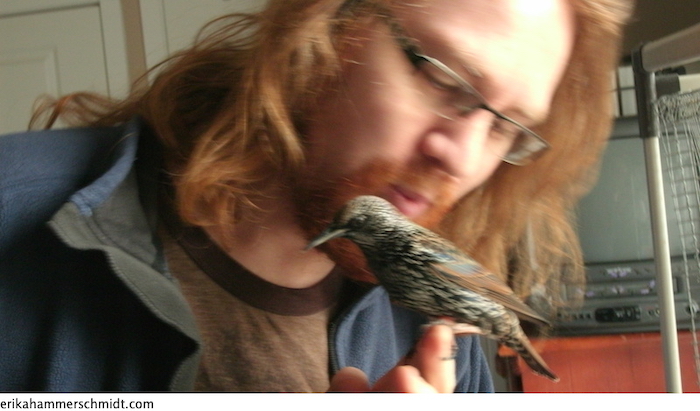
This is my husband John C Ricker.
John is a ginger.
Gingers gain a freckle for every soul they steal.
John is a photographer.
Photographs steal souls.
John almost never photographs humans.
John photographs hundreds of animals and plants.
John has hundreds of freckles.
Therefore,
animals and plants
have souls.
dreams within dreams
2014/09/02
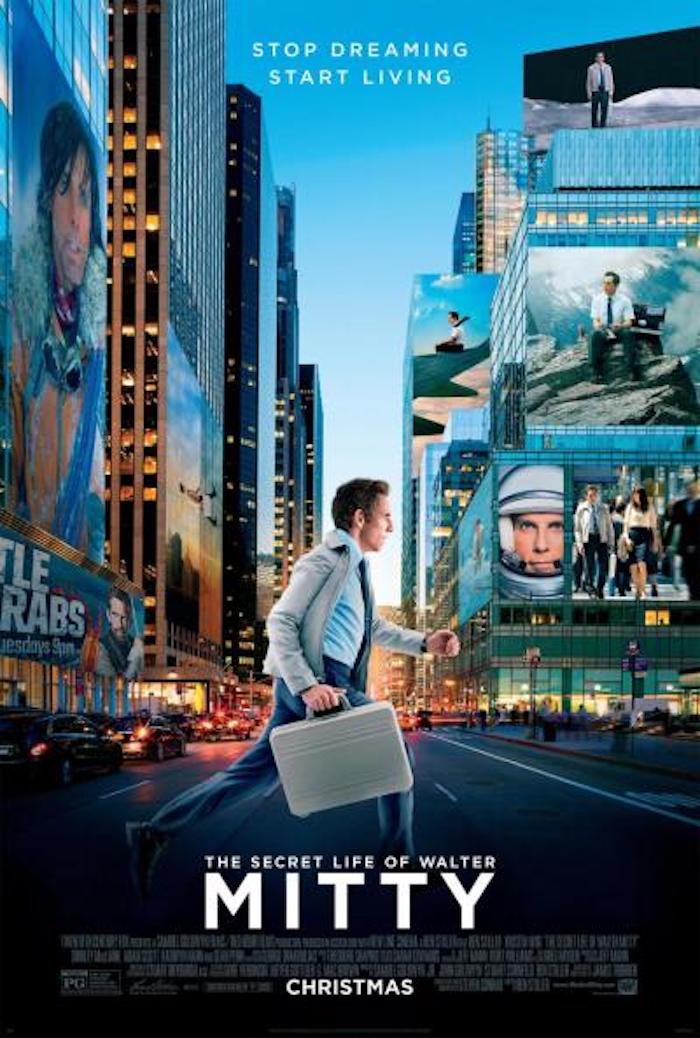
The other night, I came up with a theory about the Ben Stiller version of "The Secret Life of Walter Mitty," in which it turns out that all the "real" adventures he had were just more vivid daydreams, and his ACTUAL life was still totally boring.
My basis for this headcanon was:
1. it would be truer to the original story the movie is based on
2. in real life, the last issue of Life Magazine did not have that photo on the cover
3. in real life, it is impossible to get cell phone service in all the places he did
so, logically, these experiences must not have been real.
Then I woke up, and realized I had thought this all up IN A DREAM.
This is... so meta, I don't know what to think.
Doctor Spock
2014/09/03


The Doctor: alien, but spends most of his time with humans
Spock: half alien, half human
The Doctor: has a name that no one knows
Spock: has a family name that is never revealed onscreen
The Doctor: has two hearts
Spock: has his heart in his side instead of his chest
The Doctor: died and regenerated a buncha times
Spock: died and regenerated once
The Doctor: telepathic
Spock: yeah
The Doctor: pacifist
Spock: yeah
The Doctor: totally geeky
Spock: super yeah
The Doctor: object of a million fan crushes
Spock: *fan crush-o-meter explodes*
The Doctor: his home planet was destroyed
Spock: his home planet still exists ...you know, we've decided he wasn't enough like the Doctor already
Notebook Lifehack
2014/09/04
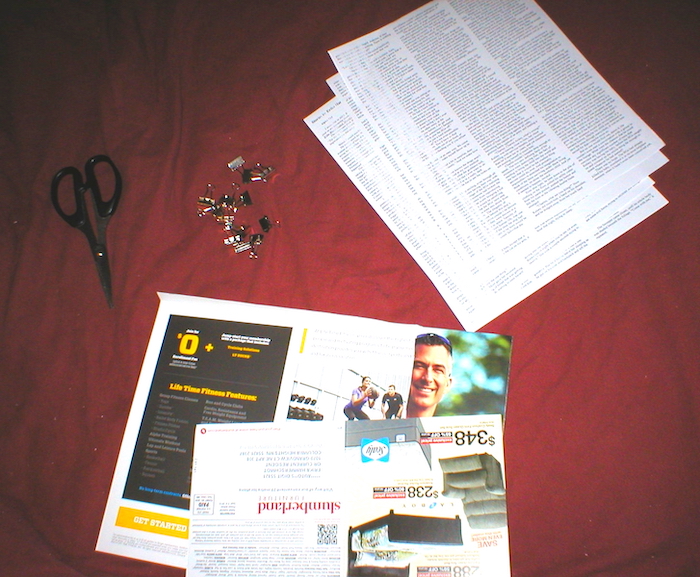
Input:
scissors
small binder clips
paperboard or slightly firm paper junk mail
printer fails (badly printed pages, wrong pages printed, etc, as long as they have one blank side)
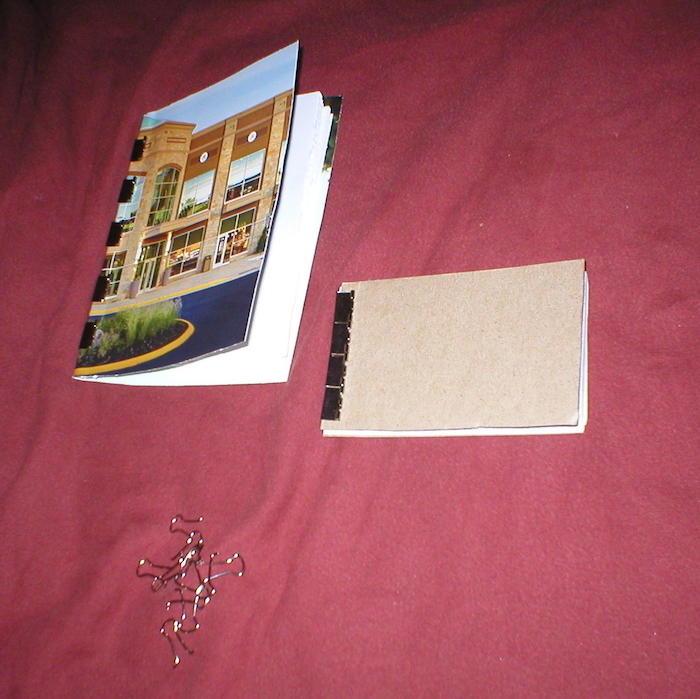
Output:
removed handles for binder clips (can throw out, or save for when the notebook is full and you want to reuse them)
cool handmade recycled notebooks for homework, sketching, grocery lists, etc.
Yay!
Sirius the Starling: the 6-inch-tall pianist
2014/09/07/
My first video of Siri playing his piano. His training is going well, but he's still a little bit shy about it.
I will post more videos as his skill improves.
(Sorry about the watermark; I am using a free version of this video editing program. When I have better videos-- after more piano lessons-- I'll either buy the program or use a different camera that doesn't insist on making 3gp files that can't be edited in iMovie.)
You're invited! Yes, you, everyone reading this.
2014/09/25/
This Saturday
Sep 27th, 2014
from noon to 5 pm
come visit me at
at
Minnehaha Free Space
3747 Minnehaha Ave
Minneapolis, MN 55406
I'll have my comics, self-published stories, jewelry and other goodies!
Here is how you get there from downtown Minneapolis. (The downtown Target is where I work, so that is why it's labeled "work" in the directions.)




Hope to see you there!
Review of Arbico Organics
2014/09/28/
So, from time to time I review things on this site. Sometimes books, sometimes programs. Today, it's bugs.
Full disclosure this time does not require saying that the producer of the bugs has promised me anything in exchange for this review, because it hasn't. I chose to write this on my own, because this company can always use more business, and I like it so much that I really, really want it to stick around.
The website Arbico Organics came to my attention when I was searching online for treats for my pet starling, Sirius. For those who aren't already aware, a starling is a mostly insectivorous bird in the wild. As pets, they can live quite well on a diet of dog food and poultry mash, but Siri's favorite treats included dried mealworms and crickets from the pet store.
However, these posed a few problems. He liked to eat a LOT of them, especially when I was training him to do tricks like playing the piano. And despite being insects, dried crickets and mealworms are not actually healthy snacks for a bird. They are mostly fat and indigestible chitin. Eating a whole lot of them is very unhealthy.
In addition, a 1.7-ounce jar of them at the pet store was in the $8- $10 range, usually the upper end of that range. At the rate he went through them, they were simply not worth the cost.
So I went looking for a healthier and cheaper starling snack. I focused on professional suppliers instead of trying to catch my own bugs to feed him, because wild bugs can carry various pesticides and parasites, and besides, I didn't have the time to go catching that many.
Eventually, I found Arbico Organics' Fly Delight.
This was a bag of dried, dead houseflies. And it seemed to be my wish come true. On their feeder insect page , Arbico Organics claimed that their pet treats "provide a natural varied diet that is easily digestible, and will not cause problems associated with chitinous, exoskeletal materials." They carried no crickets or mealworms, but lots of flies, which have a thinner and softer exoskeleton. And they appeared to be raised in a pretty safe environment, unlikely to be infected with any diseases. Looked like a healthy snack to me.
The Fly Delight cost $6.50 for 0.20 ounces... more money per ounce than the mealworms or crickets I'd been buying. But in bulk, it was different. A 1-pound bag was $34, plus enough shipping to add up to $45.97. If I were to buy enough pet-store jars of crickets or mealworms to make up a pound, that would be nine or ten jars at over $8 apiece, for a total well over $70, and probably in the $80 to $90 range if I weren't lowballing the prices. The Fly Delight was not only healthier, but close to half the price if I bought enough at once.
So I did, and when it arrived, I was impressed at the size of the bag. I'd had no idea that a pound of dead flies took up so much space! By volume, I was getting quite a lot for my money. This was going to last me a very, very long time.
I was also surprised that the text on the bag recommended refrigerating them. I wasn't sure why; dried flies would probably be fine on the shelf, as long as it wasn't too hot or humid. But just to be safe, I put them in a big container and stuck it in the back of the fridge, saving a handful of them in a small jar to keep close at hand.
Sirius loves them! In fact, at first he loved them so much that he wouldn't even do tricks while I was holding them, because he couldn't tear himself away from standing right next to them and staring directly at them! Eventually, he got used to them enough that I could use them as training treats, but he still counts them among his favorite things ever. As a starling snack, they are an absolute success.
While researching Arbico Organics, I found out that most of its business is not related to pet treats, but rather live bugs used in biological warfare against garden pests! They sell ladybugs, lacewings, nematodes, and lots of other beneficial organisms that eat things you don't want to have on your plants.
This was of interest to me, because my windowsill garden was suffering from a bad spider-mite infestation. I could hardly get any beans out of my bean vines before the spider mites ate them alive, and my tomato plants would barely live to maturity at all. I had tried cleaning the leaves with a spray bottle of water, and another spray bottle with some soap and rosemary oil, but it was having limited success, and with Siri's delicate avian respiratory system I didn't want to spray harsher chemicals indoors.
I was quite interested in the Neoseiulus Californicus mites, which not only eat spider mites, but can survive during shortages of spider mites by eating other small arthropods and even pollen. They cost more than other spider-mite predators, but they seemed worth it because they wouldn't immediately starve to death after they ate most of the spider mites, so they could potentially keep the scourge under control for a very long time.
Still, I was hesitant to spend $82.06, including the required overnight shipping for live organisms, when we were not in the greatest financial situation.
I bemoaned the whole thing to Sibre Collard, who surprised me with a wonderful offer. He hadn't been sure what to get me for my birthday or Christmas, and seeing that it was about halfway between the two, he offered to buy them for me as a combined two-occasion gift.
You know someone is an amazing friend when he can grasp the weird fact that I would consider 1,000 live bugs to be a really good present.
1,000 was the smallest quantity they came in, and the site said "Use 1,000 per 4,500 sq. ft. of infested area," so it was ridiculous overkill for a small garden like mine. I really should have shared them with other gardeners. But, alas, they had to be released within 18 hours of arrival, and I didn't know anyone else who needed spider-mite predators and could pick them up within that time frame.
They arrived in a tiny jar inside a box mostly full of packing foam and cold-packs. The jar contained some grainy material like ground-up corncobs, but the mites seemed to be mostly crawling on the inside of the jar and its lid. They were barely visible to the naked eye, a lot smaller than my spider mites. I wondered if they'd actually be able to kill them, but the website said they preyed mostly on the larvae and eggs, so I figured it could work.
I sprinkled the grainy stuff in various spots on leaves and soil throughout my window garden, and set the jar and lid next to a plant in hopes that the mites would crawl off the jar into the right places. I pulled up all the plants that were too badly mite-eaten, but I left enough spider-mite-infested areas to make sure the new mites would be able to find food quickly and keep their population going.
After a few days, I didn't see any more of them in or around the jar, so I guessed they were finding their way into the places where the spider mites were living. I couldn't really see them on any of the leaves, but I knew they were hard to see, so I just waited and hoped they were doing their job.
Four weeks later, I'm very impressed! My garden's growing well. The new bean vines I planted to replace the mite-eaten ones are flourishing without a single visible mite on them-- the first time in months that I've been able to grow bean plants this far without them getting spider-mite-infested! I see an occasional spider mite on leaves of the tomato plants, but they're not numerous enough to impede the plants' growth. These mite predators really do their job!
I don't know yet how long this will last. Maybe these lovely new mites will die of overpopulation in my little garden; maybe they'll eat everything they can eat and run out of food. Maybe the humidity and temperature aren't ideal for them and they'll die from that. Who knows. If none of them survive, then maybe someday my spider-mite problem will come back. But still, I have plenty of hope.
So, all in all, I highly recommend Arbico Organics! The refrigeration requirement on the Fly Delight was a surprise that I wish they'd mentioned on the site, but that's a small issue. I wish they sold the mite predators in a wider variety of quantities, but the 1,000-count jar certainly did the trick, and if you don't want to buy that many, you can pool funds with other gardeners and share them if you're better-prepared than I was.
Again, here are the links:
Arbico Organics. Whether you're feeding an insectivorous critter or growing veggies in your window, this site has what you're looking for. High-quality, high-quantity BUGS.
Between the Words
2014/10/19/
Work in progress: the jewelry collection I'm making for a local art show at the Vine Arts Center in Minneapolis, put on by an art discussion group called "The Art Salon for Fertile Minds."
I will post more about this show as our plans progress. Right now, it's still kind of in the concept stage.
The theme of the show is "The Space Between the Words." That can be interpreted many ways... the phrase was chosen because we are a group of artists who discuss our art at the Art Salon, and our art is created on our own time, "between the words" we say at the group.
My own interpretation refers to my short story collection, "If the World Ended, Would I Notice?" In the first story, "Doug Day," I described a necklace given by one character to another. It was basically my dream necklace, the epitome of exactly what I find beautiful.
Between two paragraphs, I included a pen-and-ink illustration of it. So the inspiration for this jewelry collection came literally from "the space between the words."
The project is almost done. It's crafted in sterling silver and stainless steel, with lemon quartz, blue mystic quartz, pearls and other assorted gemstones. I'm just waiting for some amethysts I ordered in the mail.
I will be reading aloud from "If the World Ended, Would I Notice?" at the opening.
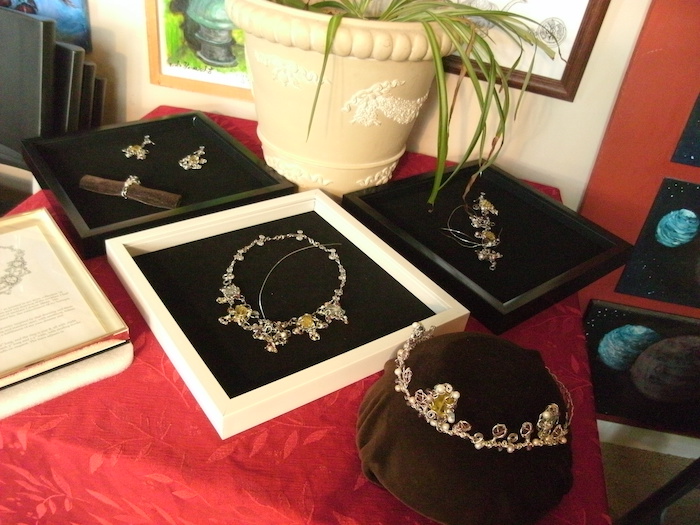
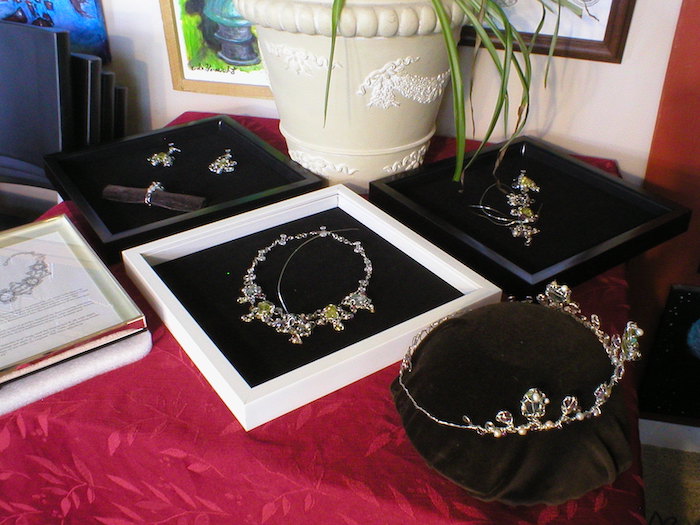
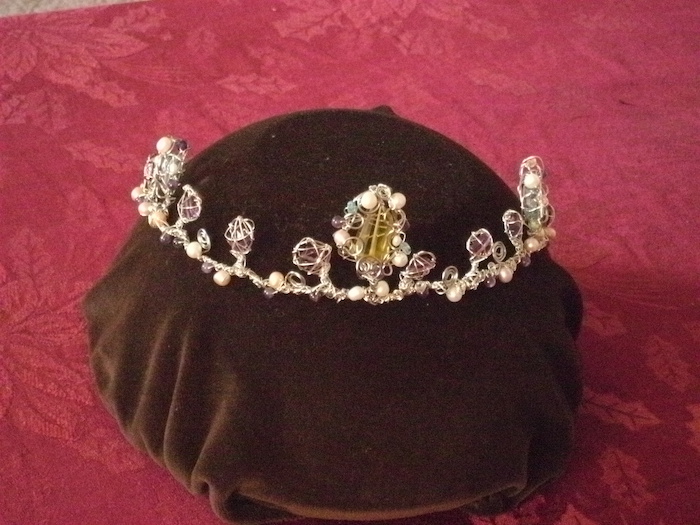
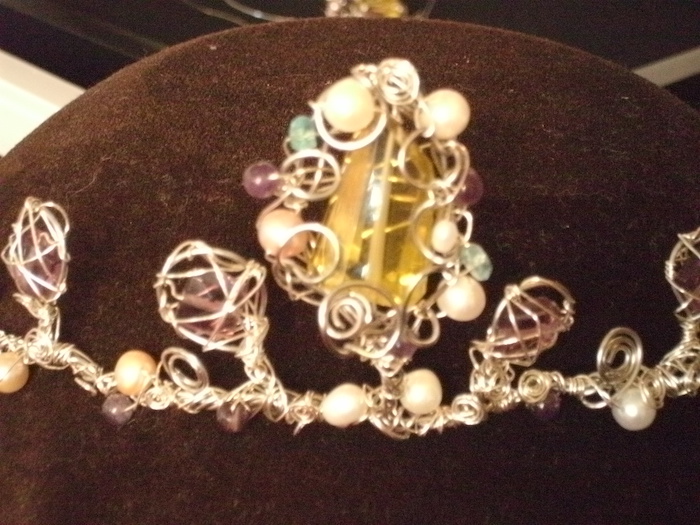
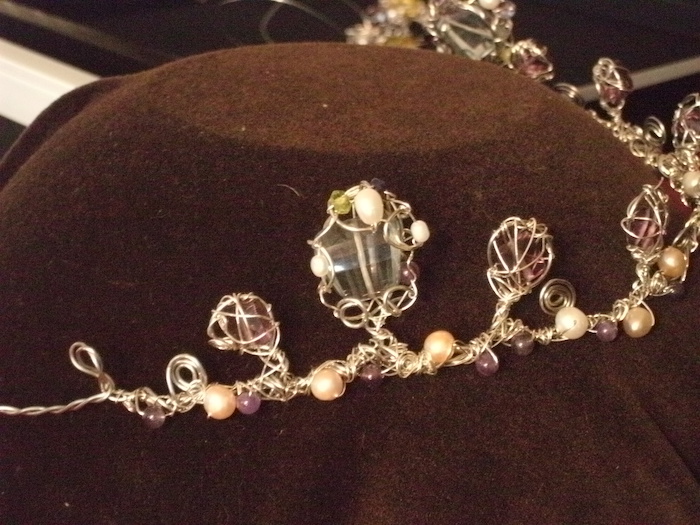
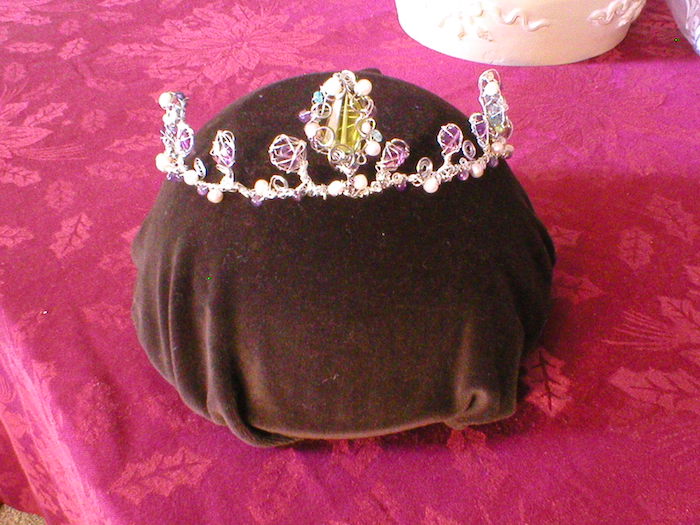
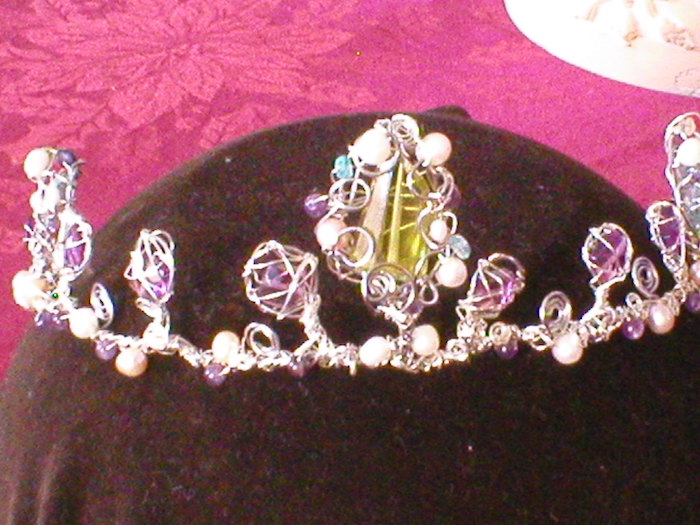
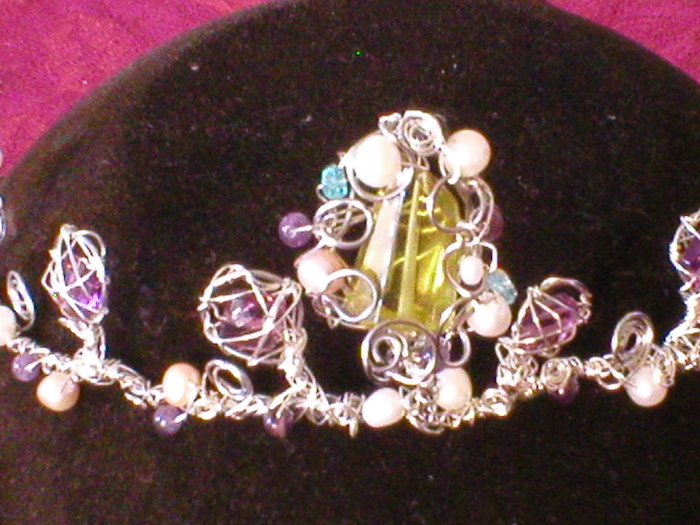
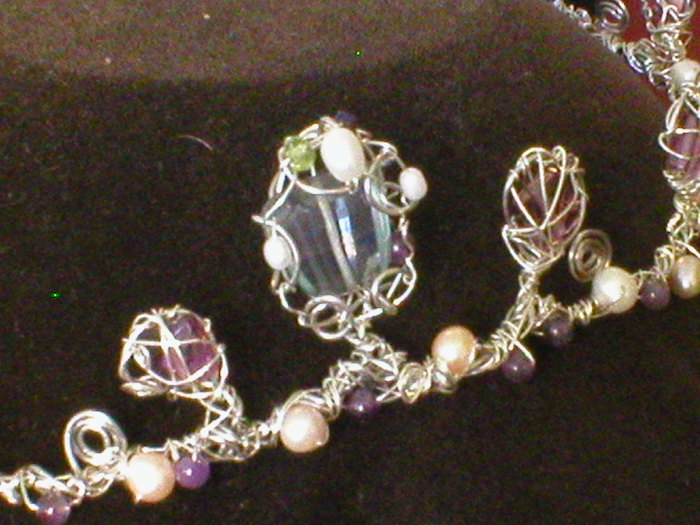
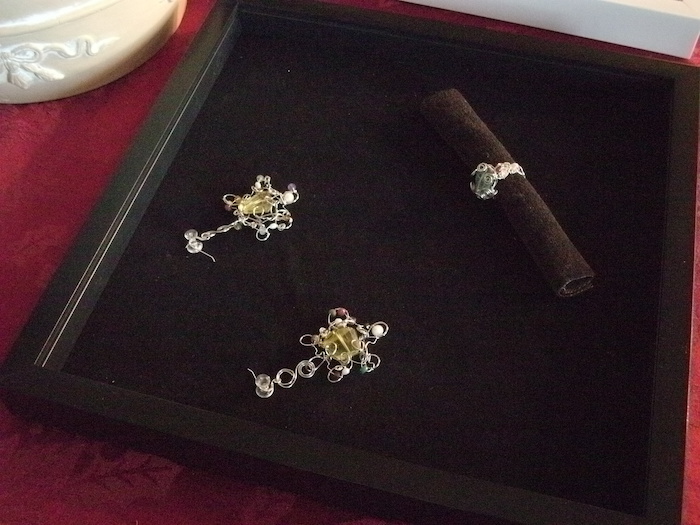
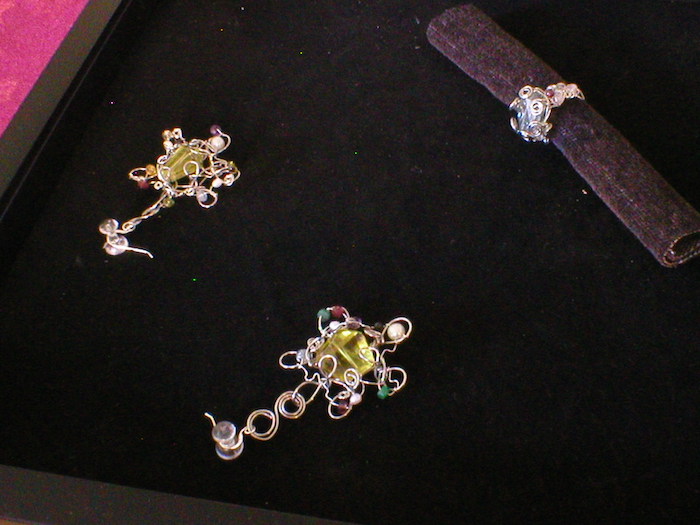
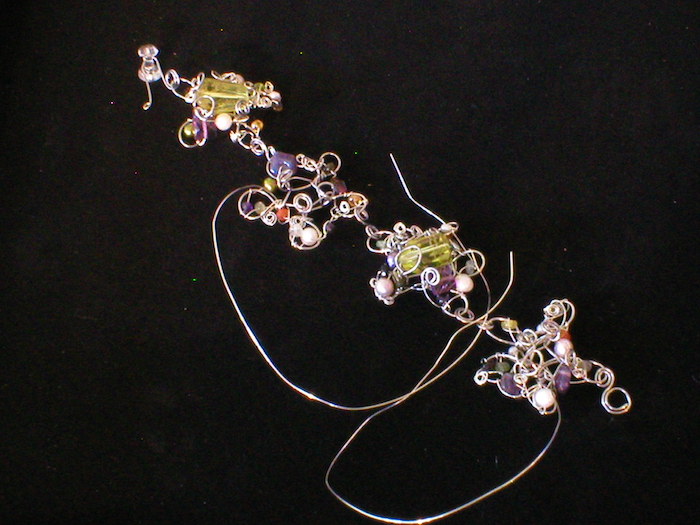
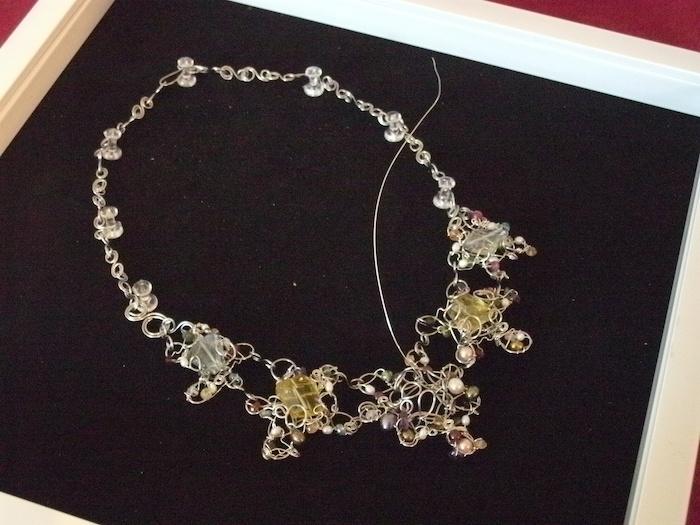
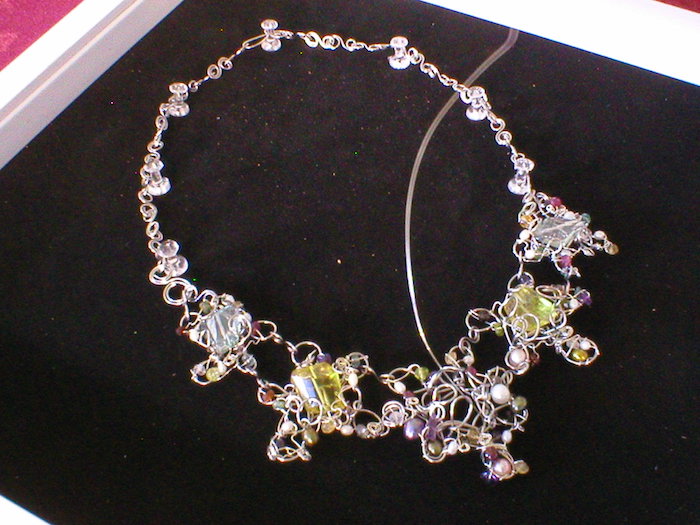
Sirius the 6-Inch Pianist, Take Two
2014/11/01/
Sirius the Starling has improved at playing the piano!
And here are some more pictures of Sirius, just because he's beautiful.
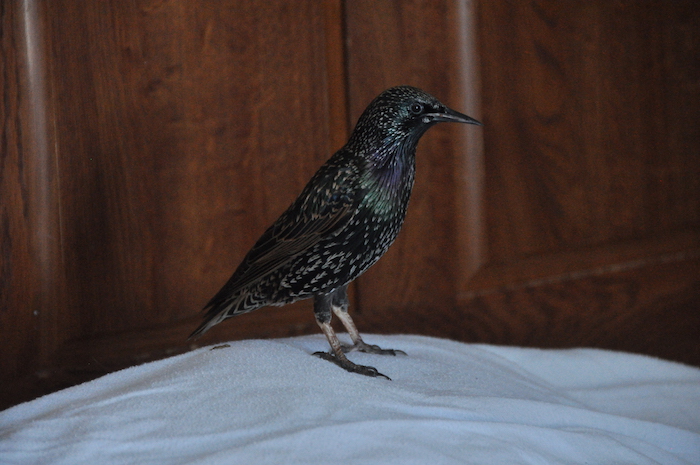
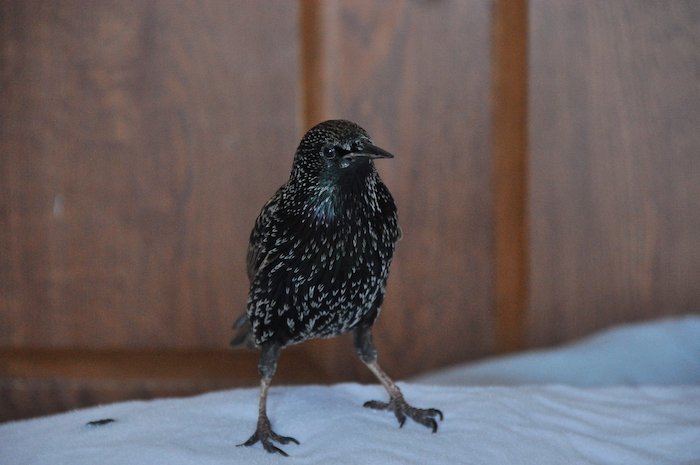
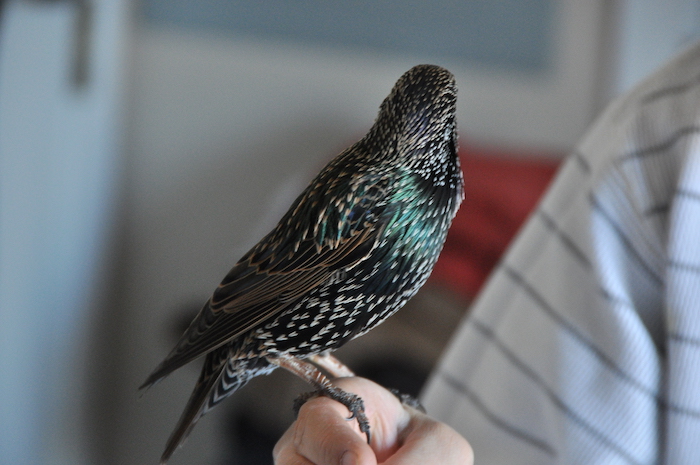
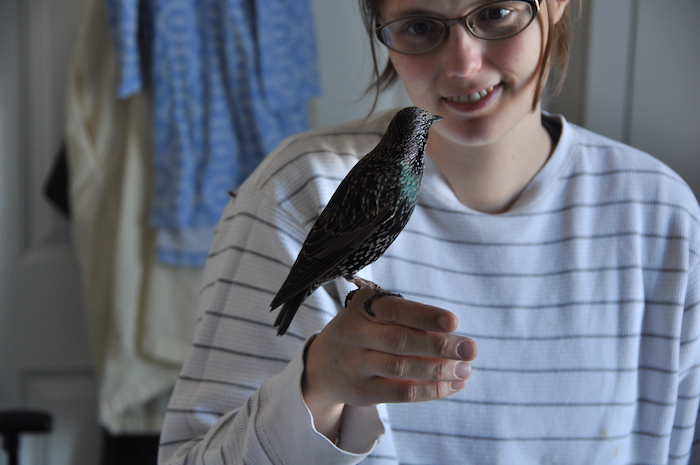
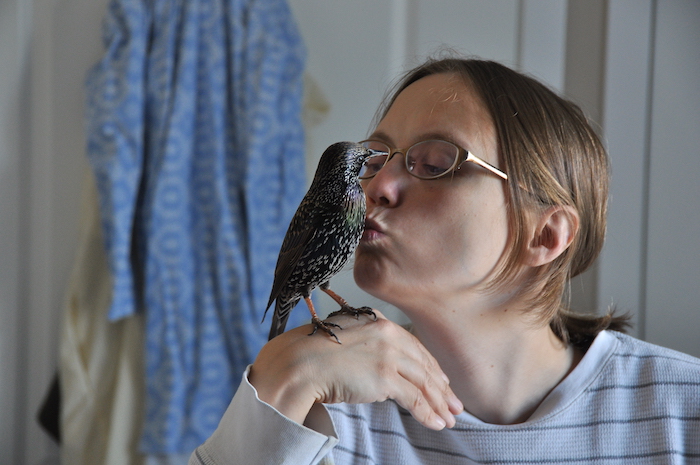
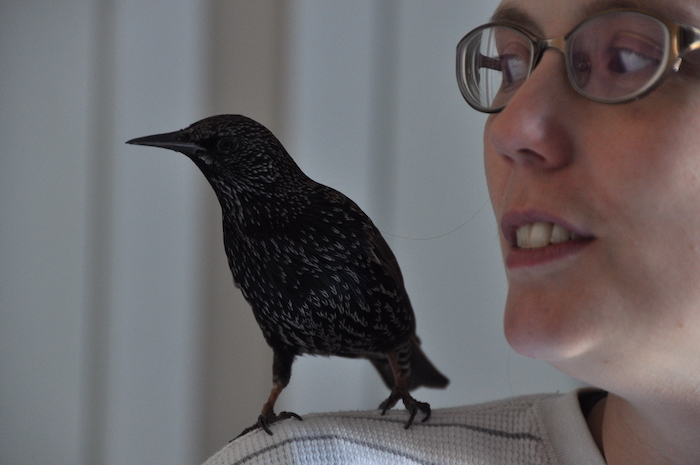
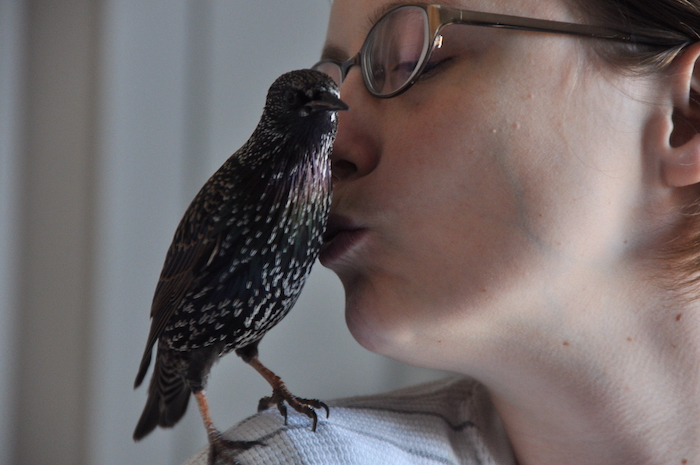
Free Space Show!!
2014/11/05/
So, the holidays are coming up.
And while you're shopping for gifts at Minnesota's many local craft fairs, I'd like to make sure you know about one of the lesser-known but still lovely ones:
Minnehaha Free Space Craft Fair and Bake Sale
Sat Dec 13, 2014
1:00 pm - 5:00 pm
This is the one at which I'll have a table, selling my handmade jewelry and other crafts.
My jewelry is crazy intricate Renaissance-fair-type stuff that you can see on my website.
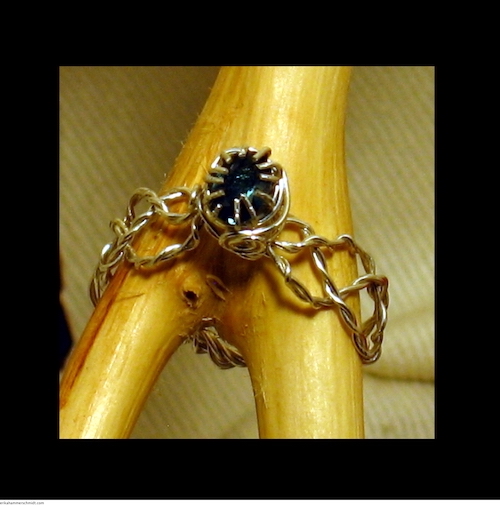
There will be lots of other cool artists too! And the prices will probably be lower than other craft fairs, because artists don't have to pay a huge fee just to get a table at this one.
Since it's a bake sale, there will also be baked goods! Probably including some vegan and gluten-free options, because Minnehaha Free Space is into that.
The craft fair will be at:
Minnehaha Free Space
3747 Minnehaha Ave
Minneapolis, MN 55406
email: radspacetc@riseup.net
call: 612-729-3733
If you can get to downtown Minneapolis, it's easy to get to Minnehaha Free Space from there by train. Here are directions from the downtown library. (I'll give very detailed step-by-step directions, because there was a time when I was so scared of going new places that I would skip out on fun events just because I would have to get to them on my own... in those days, knowing the route in this much detail would have been a big help for me.)
Without further ado:
*******
First, head from the library along Hennepin toward 5th Street:
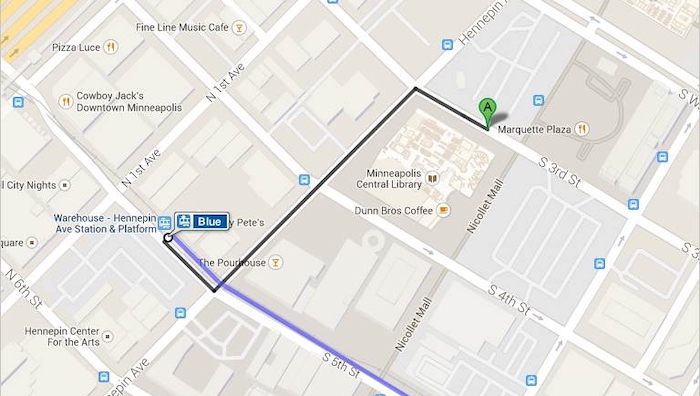

At 5th Street, turn and wait at the Warehouse Station and Platform.
Get on a Blue Line train toward Mall of America:

Get off at the 38th Street Station:



Turn left and go down 38th Street:




Turn on Minnehaha and you'll be there!

Pharmacy Tech
2014/11/10/
Passed the PTCB Exam today! If all goes well, I should receive my certificate in the next few weeks, and be a Nationally Certified Pharmacy Technician.
https://www.ptcb.org/get-certified#.VGFMbvTF-98
If you are plotting getting me a present...
2014/12/03/
Looking at my wish list, you might assume I was a lot more new-agey than I am. But no, I'm just artsy-craftsy. The crystals are because I like sparkly things and I want to wrap them in silver wire and make awesome shiny necklaces. The oils and extracts and stuff are because I'm playing with the idea of making my own lip balms, perfumes and soaps. (And, of course, the electronic gadgets are because I'm human and I'm a nerd.)
Also, I put "100" for the quantity I want of some things. That doesn't mean I really won't be satisfied until I have 100. It just means I won't mind getting multiple copies of the thing, because it's a craft supply and I may use it up.
And, no I'm not expecting that people will actually buy me all the stuff on this list. But I figured it's worth a try, since some people do tend get me presents this time of year, and I'd rather have something from this list than some random gift from someone who had no idea what I wanted.
Amazon gift cards are good too.
"Freestyle"
2014/12/30/
(For some reason my brain decided to mash up the "Iggy, freestyle for us" meme with two similarly-named products in the pharmacy. I don't even know anymore.)
Radio host: So Iggy, freestyle for us.
Iggy:

Radio host: ...Is that a breast pump?
Iggy: yes, it's for draining fluids out of your body to feed babies
Iggy: here's one for vampire babies:


More






Home - About - Books - Blog - Search
Alien Apartments - Comics - Speeches - Jewelry
Animals - Art - Poetry - Essays - Travel
Calendar - Hobbies - Wish List - Contact - Privacy




















